- How it works

"Christmas Offer"
Terms & conditions.
As the Christmas season is upon us, we find ourselves reflecting on the past year and those who we have helped to shape their future. It’s been quite a year for us all! The end of the year brings no greater joy than the opportunity to express to you Christmas greetings and good wishes.
At this special time of year, Research Prospect brings joyful discount of 10% on all its services. May your Christmas and New Year be filled with joy.
We are looking back with appreciation for your loyalty and looking forward to moving into the New Year together.
"Claim this offer"
In unfamiliar and hard times, we have stuck by you. This Christmas, Research Prospect brings you all the joy with exciting discount of 10% on all its services.
Offer valid till 5-1-2024
We love being your partner in success. We know you have been working hard lately, take a break this holiday season to spend time with your loved ones while we make sure you succeed in your academics
Discount code: RP23720

Published by Robert Bruce at August 29th, 2023 , Revised On August 12, 2024
Biology Research Topics
Are you in need of captivating and achievable research topics within the field of biology? Your quest for the best biology topics ends right here as this article furnishes you with 100 distinctive and original concepts for biology research, laying the groundwork for your research endeavor.
Table of Contents
Our proficient researchers have thoughtfully curated these biology research themes, considering the substantial body of literature accessible and the prevailing gaps in research.
Should none of these topics elicit enthusiasm, our specialists are equally capable of proposing tailor-made research ideas in biology, finely tuned to cater to your requirements.
Thus, without further delay, we present our compilation of biology research topics crafted to accommodate students and researchers.
Research Topics in Marine Biology
- Impact of climate change on coral reef ecosystems.
- Biodiversity and adaptation of deep-sea organisms.
- Effects of pollution on marine life and ecosystems.
- Role of marine protected areas in conserving biodiversity.
- Microplastics in marine environments: sources, impacts, and mitigation.
Biological Anthropology Research Topics
- Evolutionary implications of early human migration patterns.
- Genetic and environmental factors influencing human height variation.
- Cultural evolution and its impact on human societies.
- Paleoanthropological insights into human dietary adaptations.
- Genetic diversity and population history of indigenous communities.
Biological Psychology Research Topics
- Neurobiological basis of addiction and its treatment.
- Impact of stress on brain structure and function.
- Genetic and environmental influences on mental health disorders.
- Neural mechanisms underlying emotions and emotional regulation.
- Role of the gut-brain axis in psychological well-being.
Cancer Biology Research Topics
- Targeted therapies in precision cancer medicine.
- Tumor microenvironment and its influence on cancer progression.
- Epigenetic modifications in cancer development and therapy.
- Immune checkpoint inhibitors and their role in cancer immunotherapy.
- Early detection and diagnosis strategies for various types of cancer.
Also read: Cancer research topics
Cell Biology Research Topics
- Mechanisms of autophagy and its implications in health and disease.
- Intracellular transport and organelle dynamics in cell function.
- Role of cell signaling pathways in cellular response to external stimuli.
- Cell cycle regulation and its relevance to cancer development.
- Cellular mechanisms of apoptosis and programmed cell death.
Developmental Biology Research Topics
- Genetic and molecular basis of limb development in vertebrates.
- Evolution of embryonic development and its impact on morphological diversity.
- Stem cell therapy and regenerative medicine approaches.
- Mechanisms of organogenesis and tissue regeneration in animals.
- Role of non-coding RNAs in developmental processes.
Also read: Education research topics
Human Biology Research Topics
- Genetic factors influencing susceptibility to infectious diseases.
- Human microbiome and its impact on health and disease.
- Genetic basis of rare and common human diseases.
- Genetic and environmental factors contributing to aging.
- Impact of lifestyle and diet on human health and longevity.
Molecular Biology Research Topics
- CRISPR-Cas gene editing technology and its applications.
- Non-coding RNAs as regulators of gene expression.
- Role of epigenetics in gene regulation and disease.
- Mechanisms of DNA repair and genome stability.
- Molecular basis of cellular metabolism and energy production.
Research Topics in Biology for Undergraduates
- 41. Investigating the effects of pollutants on local plant species.
- Microbial diversity and ecosystem functioning in a specific habitat.
- Understanding the genetics of antibiotic resistance in bacteria.
- Impact of urbanization on bird populations and biodiversity.
- Investigating the role of pheromones in insect communication.
Also read: Psychology Research Topics
Synthetic Biology Research Topics
- Design and construction of synthetic biological circuits.
- Synthetic biology applications in biofuel production.
- Ethical considerations in synthetic biology research and applications.
- Synthetic biology approaches to engineering novel enzymes.
- Creating synthetic organisms with modified functions and capabilities.
Animal Biology Research Topics
- Evolution of mating behaviors in animal species.
- Genetic basis of color variation in butterfly wings.
- Impact of habitat fragmentation on amphibian populations.
- Behavior and communication in social insect colonies.
- Adaptations of marine mammals to aquatic environments.
Also read: Nursing research topics
Best Biology Research Topics
- Unraveling the mysteries of circadian rhythms in organisms.
- Investigating the ecological significance of cryptic coloration.
- Evolution of venomous animals and their prey.
- The role of endosymbiosis in the evolution of eukaryotic cells.
- Exploring the potential of extremophiles in biotechnology.
Biological Psychology Research Paper Topics
- Neurobiological mechanisms underlying memory formation.
- Impact of sleep disorders on cognitive function and mental health.
- Biological basis of personality traits and behavior.
- Neural correlates of emotions and emotional disorders.
- Role of neuroplasticity in brain recovery after injury.
Biological Science Research Topics:
- Role of gut microbiota in immune system development.
- Molecular mechanisms of gene regulation during development.
- Impact of climate change on insect population dynamics.
- Genetic basis of neurodegenerative diseases like Alzheimer’s.
- Evolutionary relationships among vertebrate species based on DNA analysis.
Biology Education Research Topics
- Effectiveness of inquiry-based learning in biology classrooms.
- Assessing the impact of virtual labs on student understanding of biology concepts.
- Gender disparities in science education and strategies for closing the gap.
- Role of outdoor education in enhancing students’ ecological awareness.
- Integrating technology in biology education: challenges and opportunities.
Biology-Related Research Topics
- The intersection of ecology and economics in conservation planning.
- Molecular basis of antibiotic resistance in pathogenic bacteria.
- Implications of genetic modification of crops for food security.
- Evolutionary perspectives on cooperation and altruism in animal behavior.
- Environmental impacts of genetically modified organisms (GMOs).
Biology Research Proposal Topics
- Investigating the role of microRNAs in cancer progression.
- Exploring the effects of pollution on aquatic biodiversity.
- Developing a gene therapy approach for a genetic disorder.
- Assessing the potential of natural compounds as anti-inflammatory agents.
- Studying the molecular basis of cellular senescence and aging.
Biology Research Topic Ideas
- Role of pheromones in insect mate selection and behavior.
- Investigating the molecular basis of neurodevelopmental disorders.
- Impact of climate change on plant-pollinator interactions.
- Genetic diversity and conservation of endangered species.
- Evolutionary patterns in mimicry and camouflage in organisms.
Biology Research Topics for Undergraduates
- Effects of different fertilizers on plant growth and soil health.
- Investigating the biodiversity of a local freshwater ecosystem.
- Evolutionary origins of a specific animal adaptation.
- Genetic diversity and disease susceptibility in human populations.
- Role of specific genes in regulating the immune response.
Cell and Molecular Biology Research Topics
- Molecular mechanisms of DNA replication and repair.
- Role of microRNAs in post-transcriptional gene regulation.
- Investigating the cell cycle and its control mechanisms.
- Molecular basis of mitochondrial diseases and therapies.
- Cellular responses to oxidative stress and their implications in ageing.
These topics cover a broad range of subjects within biology, offering plenty of options for research projects. Remember that you can further refine these topics based on your specific interests and research goals.
Frequently Asked Questions
What are some good research topics in biology?
A good research topic in biology will address a specific problem in any of the several areas of biology, such as marine biology, molecular biology, cellular biology, animal biology, or cancer biology.
A topic that enables you to investigate a problem in any area of biology will help you make a meaningful contribution.
How to choose a research topic in biology?
Choosing a research topic in biology is simple.
Follow the steps:
- Generate potential topics.
- Consider your areas of knowledge and personal passions.
- Conduct a thorough review of existing literature.
- Evaluate the practicality and viability.
- Narrow down and refine your research query.
- Remain receptive to new ideas and suggestions.
Who Are We?
For several years, Research Prospect has been offering students around the globe complimentary research topic suggestions. We aim to assist students in choosing a research topic that is both suitable and feasible for their project, leading to the attainment of their desired grades. Explore how our services, including research proposal writing , dissertation outline creation, and comprehensive thesis writing , can contribute to your college’s success.
You May Also Like
Academic integrity: a commitment to honesty and ethical conduct in learning. Upholding originality and proper citation are its cornerstones.
Should you use MLA or APA citation style in your dissertation, thesis, or research paper? Choose by reading this comprehensive blog.
Want to score band 9 on your IELTS essay? Here are some tips and IELTS sample essays to help you get the score you want.
Ready to place an order?
USEFUL LINKS
Learning resources.

COMPANY DETAILS

- How It Works
Are you seeking one-on-one college counseling and/or essay support? Limited spots are now available. Click here to learn more.
49 Most Interesting Biology Research Topics
August 21, 2023
In need of the perfect biology research topics—ideas that can both showcase your intellect and fuel your academic success? Lost in the boundless landscape of possible biology topics to research? And afraid you’ll never get a chance to begin writing your paper, let alone finish writing? Whether you’re a budding biologist hoping for a challenge or a novice seeking easy biology research topics to wade into, this blog offers curated and comprehensible options.
And if you’re a high school or transfer student looking for opportunities to immerse yourself in biology, consider learning more about research opportunities for high school students , top summer programs for high school students , best colleges for studying biomedical engineering , and best colleges for studying biology .
What is biology?
Well, biology explores the web of life that envelops our planet, from the teeny-tiny microbes to the big complex ecosystems. Biology investigates the molecular processes that define existence, deciphers the interplay of genes, and examines all the dynamic ways organisms interact with their environments. And through biology, you can gain not only knowledge, but a deeper appreciation for the interconnectedness of all living things. Pretty cool!
There are lots and lots of sub-disciplines within biology, branching out in all directions. Throughout this list, we won’t follow all of those branches, but we will follow many. And while none of these branches are truly simple or easy, some might be easier than others. Now we’ll take a look at a few various biology research topics and example questions that could pique your curiosity.
Climate change and ecosystems
The first of our potentially easy biology research topics: climate change and ecosystems. Investigate how ecosystems respond and adapt to the changing climate. And learn about shifts in species distributions , phenology , and ecological interactions .
1) How are different ecosystems responding to temperature changes and altered precipitation patterns?2) What are the implications of shifts in species distributions for ecosystem stability and functioning?
2) Or how does phenology change in response to climate shifts? And how do those changes impact species interactions?
3) Which underlying genetic and physiological mechanisms enable certain species to adapt to changing climate conditions?
4) And how do changing climate conditions affect species’ abilities to interact and form mutualistic relationships within ecosystems?
Microbiome and human health
Intrigued by the relationship between the gut and the rest of the body? Study the complex microbiome . You could learn how gut microbes influence digestion, immunity, and even mental health.
5) How do specific gut microbial communities impact nutrient absorption?
6) What are the connections between the gut microbiome, immune system development, and susceptibility to autoimmune diseases?
7) What ethical considerations need to be addressed when developing personalized microbiome-based therapies? And how can these therapies be safely and equitably integrated into clinical practice?
8) Or how do variations in the gut microbiome contribute to mental health conditions such as anxiety and depression?
9) How do changes in diet and lifestyle affect the composition and function of the gut microbiome? And what are the subsequent health implications?
Urban biodiversity conservation
Next, here’s another one of the potentially easy biology research topics. Examine the challenges and strategies for conserving biodiversity in urban environments. Consider the impact of urbanization on native species and ecosystem services. Then investigate the decline of pollinators and its implications for food security or ecosystem health.
10) How does urbanization influence the abundance and diversity of native plant and animal species in cities?
11) Or what are effective strategies for creating and maintaining green spaces that support urban biodiversity and ecosystem services?
12) How do different urban design and planning approaches impact the distribution of wildlife species and their interactions?
13) What are the best practices for engaging urban communities in biodiversity conservation efforts?
14) And how can urban agriculture and rooftop gardens contribute to urban biodiversity conservation while also addressing food security challenges?
Bioengineering
Are you a problem solver at heart? Then try approaching the intersection of engineering, biology, and medicine. Delve into the field of synthetic biology , where researchers engineer biological systems to create novel organisms with useful applications.
15) How can synthetic biology be harnessed to develop new, sustainable sources of biofuels from engineered microorganisms?
16) And what ethical considerations arise when creating genetically modified organisms for bioremediation purposes?
17) Can synthetic biology techniques be used to design plants that are more efficient at withdrawing carbon dioxide from the atmosphere?
18) How can bioengineering create organisms capable of producing valuable pharmaceutical compounds in a controlled and sustainable manner?
19) But what are the potential risks and benefits of using engineered organisms for large-scale environmental cleanup projects?
Neurobiology
Interested in learning more about what makes creatures tick? Then this might be one of your favorite biology topics to research. Explore the neural mechanisms that underlie complex behaviors in animals and humans. Shed light on topics like decision-making, social interactions, and addiction. And investigate how brain plasticity and neurogenesis help the brain adapt to learning, injury, and aging.
20) How does the brain’s reward circuitry influence decision-making processes in situations involving risk and reward?
21) What neural mechanisms underlie empathy and social interactions in both humans and animals?
22) Or how do changes in neural plasticity contribute to age-related cognitive decline and neurodegenerative diseases?
23) Can insights from neurobiology inform the development of more effective treatments for addiction and substance abuse?
24) What are the neural correlates of learning and memory? And how can our understanding of these processes be applied to educational strategies?
Plant epigenomics
While this might not be one of the easy biology research topics, it will appeal to plant enthusiasts. Explore how epigenetic modifications in plants affect their ability to respond and adapt to changing environmental conditions.
25) How do epigenetic modifications influence the expression of stress-related genes in plants exposed to temperature fluctuations?
26) Or what role do epigenetic changes play in plants’ abilities to acclimate to changing levels of air pollution?
27) Can certain epigenetic modifications be used as indicators of a plant’s adaptability to new environments?
28) How do epigenetic modifications contribute to the transgenerational inheritance of traits related to stress resistance?
29) And can targeted manipulation of epigenetic marks enhance crop plants’ ability to withstand changing environmental conditions?
Conservation genomics
Motivated to save the planet? Conservation genomics stands at the forefront of modern biology, merging the power of genetics with the urgent need to protect Earth’s biodiversity. Study genetic diversity, population dynamics, and how endangered species adapt in response to environmental changes.
30) How does genetic diversity within endangered species influence their ability to adapt to changing environmental conditions?
31) What genetic factors contribute to the susceptibility of certain populations to diseases, and how can this knowledge inform conservation strategies?
32) How can genomic data be used to inform captive breeding and reintroduction programs for endangered species?
33) And what are the genomic signatures of adaptation in response to human-induced environmental changes, such as habitat fragmentation and pollution?
34) Or how can genomics help identify “hotspots” of biodiversity that are particularly important for conservation efforts?
Zoonotic disease transmission
And here’s one of the biology research topics that’s been on all our minds in recent years. Investigate the factors contributing to the transmission of zoonotic diseases , like COVID-19. Then posit strategies for prevention and early detection.
35) What are the ecological and genetic factors that facilitate the spillover of zoonotic pathogens from animals to humans?
36) Or how do changes in land use, deforestation, and urbanization impact the risk of zoonotic disease emergence?
37) Can early detection and surveillance systems be developed to predict and mitigate the spread of zoonotic diseases?
38) How do social and cultural factors influence human behaviors that contribute to zoonotic disease transmission?
39) And can strategies be implemented to improve global pandemic preparedness?
Bioinformatics
Are you a data fanatic? Bioinformatics involves developing computational tools and techniques to analyze and interpret large biological datasets. This enables advancements in genomics, proteomics, and systems biology. So delve into the world of bioinformatics to learn how large-scale genomic and molecular data are revolutionizing biological research.
40) How can machine learning algorithms predict the function of genes based on their DNA sequences?
41) And what computational methods can identify potential drug targets by analyzing protein-protein interactions in large biological datasets?
42) Can bioinformatics tools be used to identify potential disease-causing mutations in human genomes and guide personalized medicine approaches?
43) What are the challenges and opportunities in analyzing “omics” data (genomics, proteomics, transcriptomics) to uncover novel biological insights?
44) Or how can bioinformatics contribute to our understanding of microbial diversity, evolution, and interactions within ecosystems?
Regenerative medicine
While definitely not one of the easy biology research topics, regenerative medicine will appeal to those interested in healthcare. Research innovative approaches to stimulate tissue and organ regeneration, using stem cells, tissue engineering, and biotechnology. And while you’re at it, discover the next potential medical breakthrough.
45) How can stem cells be directed to differentiate into specific cell types for tissue regeneration, and what factors influence this process?
46) Or what are the potential applications of 3D bioprinting in creating functional tissues and organs for transplantation?
47) How can bioengineered scaffolds enhance tissue regeneration and integration with host tissues?
48) What are the ethical considerations surrounding the use of stem cells and regenerative therapies in medical treatments?
49) And can regenerative medicine approaches be used to treat neurodegenerative disorders and restore brain function?
Biology Research Topics – Final thoughts
So as you take your next steps, try not to feel overwhelmed. And instead, appreciate the vast realm of possibilities that biology research topics offer. Because the array of biology topics to research is as diverse as the ecosystems it seeks to understand. And no matter if you’re only looking for easy biology research topics, or you’re itching to unravel the mysteries of plant-microbe interactions, your exploration will continue to deepen what we know of the world around us.
- High School Success
Mariya holds a BFA in Creative Writing from the Pratt Institute and is currently pursuing an MFA in writing at the University of California Davis. Mariya serves as a teaching assistant in the English department at UC Davis. She previously served as an associate editor at Carve Magazine for two years, where she managed 60 fiction writers. She is the winner of the 2015 Stony Brook Fiction Prize, and her short stories have been published in Mid-American Review , Cutbank , Sonora Review , New Orleans Review , and The Collagist , among other magazines.
- 2-Year Colleges
- ADHD/LD/Autism/Executive Functioning
- Application Strategies
- Best Colleges by Major
- Best Colleges by State
- Big Picture
- Career & Personality Assessment
- College Essay
- College Search/Knowledge
- College Success
- Costs & Financial Aid
- Data Visualizations
- Dental School Admissions
- Extracurricular Activities
- Graduate School Admissions
- High Schools
- Homeschool Resources
- Law School Admissions
- Medical School Admissions
- Navigating the Admissions Process
- Online Learning
- Outdoor Adventure
- Private High School Spotlight
- Research Programs
- Summer Program Spotlight
- Summer Programs
- Teacher Tools
- Test Prep Provider Spotlight
“Innovative and invaluable…use this book as your college lifeline.”
— Lynn O'Shaughnessy
Nationally Recognized College Expert
College Planning in Your Inbox
Join our information-packed monthly newsletter.
200+ Unique And Interesting Biology Research Topics For Students In 2023

Are you curious about the fascinating world of biology and its many research possibilities? Well, you are in the right place! In this blog, we will explore biology research topics, exploring what biology is, what constitutes a good research topic, and how to go about selecting the perfect one for your academic journey.
So, what exactly is biology? Biology is the study of living organisms and their interactions with the environment. It includes everything from the tiniest cells to the largest ecosystems, making it a diverse and exciting field of study.
Stay tuned to learn more about biology research topics as we present over 200 intriguing research ideas for students, emphasizing the importance of selecting the right one. In addition, we will also share resources to make your quest for the perfect topic a breeze. Let’s embark on this scientific journey together!
If you are having trouble with any kind of assignment or task, do not worry—we can give you the best microbiology assignment help at a value price. Additionally, you may look at nursing project ideas .
What Is Biology?
Table of Contents
Biology is the study of living things, like animals, plants, and even tiny organisms too small to see. It helps us understand how these living things work and how they interact with each other and their environment. Biologists, or scientists who study biology, explore topics like how animals breathe, how plants grow, and how our bodies function. By learning about biology, we can better care for the Earth and all its living creatures.
What Is A Good Biology Research Topic?
A good biology research topic is a question or problem in the field of biology that scientists want to investigate and learn more about. It should be interesting and important, like studying how a new medicine can treat a disease or how animals adapt to changing environments. The topic should also be specific and clear, so researchers can focus on finding answers. Additionally, it’s helpful if the topic hasn’t been studied extensively before, so the research can contribute new knowledge to the field of biology and help us better understand the natural world.
Tips For Choosing A Biology Research Topics
Here are some tips for choosing a biology research topics:
1. Choose What Interests You
When picking a biology research topic, go for something that you personally find fascinating and enjoyable. When you’re genuinely curious about it, you’ll be more motivated to study and learn.
2. Select a Significant Topic
Look for a subject in biology that has real-world importance. Think about whether your research can address practical issues, like finding cures for diseases or understanding environmental problems. Research that can make a positive impact is usually a good choice.
3. Check If It’s Doable
Consider if you have the necessary tools and time to carry out your research. It’s essential to pick a topic that you can actually study with the resources available to you.
4. Add Your Unique Perspective
Try to find a fresh or different angle for your research. While you can build upon existing knowledge, bringing something new or unique to the table can make your research more exciting and valuable.
5. Seek Guidance
Don’t hesitate to ask for advice from your teachers or experienced researchers. They can provide you with valuable insights and help you make a smart decision when choosing your research topic in biology.
Biology Research Topics For College Students
1. Investigating the role of genetic mutations in cancer development.
2. Analyzing the impact of climate changes on wildlife populations.
3. Studying the ecology of invasive species in urban environments.
4. Investigating the microbiome of the human gut and its relationship to health.
5. Analyzing the genetic diversity of endangered species for conservation.
6. Studying the evolution of antibiotic resistance in bacteria.
7. Investigating the ecological consequences of deforestation.
8. Analyzing the behavior and communication of social insects like ants and bees.
9. Studying the physiology of extreme environments, such as deep-sea hydrothermal vents.
10. Investigating the molecular mechanisms of cell division and mitosis.
Plant Biology Research Topics For College Students
11. Studying the impact of different fertilizers on crop yields and soil health.
12. Analyzing the genetics of plant resistance to pests and diseases.
13. Investigating the role of plant hormones in growth and development.
14. Studying the adaptation of plants to drought conditions.
15. Analyzing the ecological interactions between plants and pollinators.
16. Investigating the use of biotechnology to enhance crop traits.
17. Studying the genetics of plant breeding for improved varieties.
18. Analyzing the physiology of photosynthesis and carbon fixation in plants.
19. Investigating the effects of soil microbiota on plant health.
20. Studying the evolution of plant species in response to changing environments.
Biotechnology Research Topics For College Students
21. Investigating the use of CRISPR-Cas9 technology for genome editing.
22. Analyzing the production of biofuels from microorganisms.
23. Studying the application of biotechnology in medicine, such as gene therapy.
24. Investigating the use of bioplastics as a sustainable alternative to conventional plastics.
25. Analyzing the role of biotechnology in food production, including GMOs.
26. Studying the development of biopharmaceuticals and monoclonal antibodies.
27. Investigating the use of bioremediation to clean up polluted environments.
28. Studying the potential of synthetic biology for creating novel organisms.
29. Analyzing the ethical and social implications of biotechnological advancements.
30. Investigating the use of biotechnology in forensic science, such as DNA analysis.
Molecular Biology Research Topics For Undergraduates
31. Studying the structure and function of DNA and RNA molecules.
32. Analyzing the regulation of gene expression in eukaryotic cells.
33. Investigating the mechanisms of DNA replication and repair.
34. Studying the role of non-coding RNAs in gene regulation.
35. Analyzing the molecular basis of genetic diseases like cystic fibrosis.
36. Investigating the epigenetic modifications that control gene activity.
37. Studying the molecular mechanisms of protein folding and misfolding.
38. Analyzing the molecular pathways involved in cancer progression.
39. Investigating the molecular basis of neurodegenerative diseases.
40. Studying the use of molecular markers in genetic diversity analysis.
Life Science Research Topics For High School Students
41. Investigating the effects of different diets on human health.
42. Analyzing the impact of exercise on cardiovascular fitness.
43. Studying the genetics of inherited traits and diseases.
44. Investigating the ecological interactions in a local ecosystem.
45. Analyzing the diversity of microorganisms in soil or water samples.
46. Studying the anatomy and physiology of a specific organ or system.
47. Investigating the life cycle of a local plant or animal species.
48. Studying the effects of environmental pollutants on aquatic organisms.
49. Analyzing the behavior of a specific animal species in its habitat.
50. Investigating the process of photosynthesis in plants.
Biology Research Topics For Grade 12
51. Investigating the genetic basis of a specific inherited disorder.
52. Analyzing the impact of climate change on a local ecosystem.
53.Studying the biodiversity of a particular rainforest region.
54. Investigating the physiological adaptations of animals to extreme temperatures.
55. Analyzing the effects of pollution on aquatic ecosystems.
56. Studying the life history and conservation status of an endangered species.
57. Investigating the molecular mechanisms of a specific disease.
58. Studying the ecological interactions within a coral reef ecosystem.
59. Analyzing the genetics of plant hybridization and speciation.
60. Investigating the behavior and communication of a particular bird species.
Marine Biology Research Topics
61. Studying the impact of ocean acidification on coral reefs.
62. Analyzing the migration patterns of marine mammals.
63. Investigating the physiology of deep-sea creatures under high pressure.
64. Studying the ecology of phytoplankton and their role in the marine food web.
65. Analyzing the behavior of different species of sharks.
66. Investigating the conservation of sea turtle populations.
67. Studying the biodiversity of deep-sea hydrothermal vent communities.
68. Analyzing the effects of overfishing on marine ecosystems.
69. Investigating the adaptation of marine organisms to extreme cold in polar regions.
70. Studying the bioluminescence and communication in marine organisms.
AP Biology Research Topics
71. Investigating the role of specific enzymes in cellular metabolism.
72. Analyzing the genetic variation within a population.
73. Studying the mechanisms of hormonal regulation in animals.
74. Investigating the principles of Mendelian genetics through trait analysis.
75. Analyzing the ecological succession in a local ecosystem.
76. Studying the physiology of the human circulatory system.
77. Investigating the molecular biology of a specific virus.
78. Studying the principles of natural selection through evolutionary simulations.
79. Analyzing the genetic diversity of a plant species in different habitats.
80. Investigating the effects of different environmental factors on plant growth.
Cell Biology Research Topics
81. Investigating the role of mitochondria in cellular energy production.
82. Analyzing the mechanisms of cell division and mitosis.
83. Studying the function of cell membrane proteins in signal transduction.
84. Investigating the cellular processes involved in apoptosis (cell death).
85. Analyzing the role of endoplasmic reticulum in protein synthesis and folding.
86. Studying the dynamics of the cytoskeleton and cell motility.
87. Investigating the regulation of cell cycle checkpoints.
88. Analyzing the structure and function of cellular organelles.
89. Studying the molecular mechanisms of DNA replication and repair.
90. Investigating the impact of cellular stress on cell health and function.
Human Biology Research Topics
91. Analyzing the genetic basis of inherited diseases in humans.
92. Investigating the physiological responses to exercise and physical activity.
93. Studying the hormonal regulation of the human reproductive system.
94. Analyzing the impact of nutrition on human health and metabolism.
95. Investigating the role of the immune system in disease prevention.
96. Studying the genetics of human evolution and migration.
97. Analyzing the neural mechanisms underlying human cognition and behavior.
98. Investigating the molecular basis of aging and age-related diseases.
99. Studying the impact of environmental toxins on human health.
100. Analyzing the genetics of organ transplantation and tissue compatibility.
Molecular Biology Research Topics
101. Investigating the role of microRNAs in gene regulation.
102. Analyzing the molecular basis of genetic disorders like cystic fibrosis.
103. Studying the epigenetic modifications that control gene expression.
104. Investigating the molecular mechanisms of RNA splicing.
105. Analyzing the role of telomeres in cellular aging.
106. Studying the molecular pathways involved in cancer metastasis.
107. Investigating the molecular basis of neurodegenerative diseases.
108. Studying the molecular interactions in protein-protein networks.
109. Analyzing the molecular mechanisms of DNA damage and repair.
110. Investigating the use of CRISPR-Cas9 for genome editing.
Animal Biology Research Topics
111. Studying the behavior and communication of social insects like ants.
112. Analyzing the physiology of hibernation in mammals.
113. Investigating the ecological interactions in a predator-prey relationship.
114. Studying the adaptations of animals to extreme environments.
115. Analyzing the genetics of inherited traits in animal populations.
116. Investigating the impact of climate change on animal migration patterns.
117. Studying the diversity of marine life in coral reef ecosystems.
118. Analyzing the physiology of flight in birds and bats.
119. Investigating the molecular basis of animal coloration and camouflage.
120. Studying the behavior and conservation of endangered species.
- Neuroscience Research Topics
- Mental Health Research Topics
Plant Biology Research Topics
121. Investigating the role of plant hormones in growth and development.
122. Analyzing the genetics of plant resistance to pests and diseases.
123. Climate change and plant phenology are being examined.
124. Investigating the ecology of mycorrhizal fungi and their symbiosis with plants.
125. Investigating plant photosynthesis and carbon fixing.
126. Molecular analysis of plant stress responses.
127. Investigating the adaptation of plants to drought conditions.
128. Studying the role of plants in phytoremediation of polluted environments.
129. Analyzing the genetics of plant hybridization and speciation.
130. Investigating the molecular basis of plant-microbe interactions.
Environmental Biology Research Topics
131. Analyzing the effects of pollution on aquatic ecosystems.
132. Investigating the biodiversity of a particular ecosystem.
133. Studying the ecological consequences of deforestation.
134. Analyzing the impact of climate change on wildlife populations.
135. Investigating the use of bioremediation to clean up polluted sites.
136. Studying the environmental factors influencing species distribution.
137. Analyzing the effects of habitat fragmentation on wildlife.
138. Investigating the ecology of invasive species in new environments.
139. Studying the conservation of endangered species and habitats.
140. Analyzing the interactions between humans and urban ecosystems.
Chemical Biology Research Topics
141. Investigating the design and synthesis of new drug compounds.
142. Analyzing the molecular mechanisms of enzyme catalysis.
143.Studying the role of small molecules in cellular signaling pathways.
144. Investigating the development of chemical probes for biological research.
145. Studying the chemistry of protein-ligand interactions.
146. Analyzing the use of chemical biology in cancer therapy.
147. Investigating the synthesis of bioactive natural products.
148. Studying the role of chemical compounds in microbial interactions.
149. Analyzing the chemistry of DNA-protein interactions.
150. Investigating the chemical basis of drug resistance in pathogens.
Medical Biology Research Topics
151. Investigating the genetic basis of specific diseases like diabetes.
152. Analyzing the mechanisms of drug resistance in bacteria.
153. Studying the molecular mechanisms of autoimmune diseases.
154. Investigating the development of personalized medicine approaches.
155. Studying the role of inflammation in chronic diseases.
156. Analyzing the genetics of rare diseases and genetic syndromes.
157. Investigating the molecular basis of viral infections and vaccines.
158. Studying the mechanisms of organ transplantation and rejection.
159. Analyzing the molecular diagnostics of cancer.
160. Investigating the biology of stem cells and regenerative medicine.
Evolutionary Biology Research Topics
161. Studying the evolution of human ancestors and early hominids.
162. The genetic variety of species and between species is being looked at.
163. Investigating the role of sexual selection in animal evolution.
164. Studying the co-evolutionary relationships between parasites and hosts.
165. Analyzing the evolutionary adaptations of extremophiles.
166. Investigating the evolution of developmental processes (evo-devo).
167. Studying the biogeography and distribution of species.
168. Analyzing the evolution of mimicry in animals and plants.
169. Investigating the genetics of speciation and hybridization.
170. Studying the evolutionary history of domesticated plants and animals.
Cellular Biology Research Topics
171. Investigating the role of autophagy in cellular homeostasis.
172. Analyzing the mechanisms of cellular transport and trafficking.
173. Studying the regulation of cell adhesion & migration.
174. Investigating the cellular responses to DNA damage.
175. Analyzing the dynamics of cellular membrane structures.
176. Studying the role of cellular organelles in lipid metabolism.
177. Investigating the molecular mechanisms of cell-cell communication.
178. Studying the physiology of cellular respiration and energy production.
179. Analyzing the cellular mechanisms of viral entry and replication.
180. Investigating the role of cellular senescence in aging and disease.
Good Biology Research Topics Related To Brain Injuries
181. Analyzing the molecular mechanisms of traumatic brain injury.
182. Investigating the role of neuroinflammation in brain injury recovery.
183. Studying the impact of concussions on long-term brain health.
184. Analyzing the use of neuroimaging in diagnosing brain injuries.
185. Investigating the development of neuroprotective therapies.
186. Studying the genetics of susceptibility to brain injuries.
187. Analyzing the cognitive and behavioral effects of brain trauma.
188. Investigating the role of rehabilitation in brain injury recovery.
189. Studying the cellular and molecular changes in axonal injury.
190. Looking into how stem cell therapy might be used to help brain injuries.
Biology Quantitative Research Topics
191. Investigating the mathematical modeling of population dynamics.
192. Analyzing the statistical methods for biodiversity assessment.
193. Studying the use of bioinformatics in genomics research.
194. Investigating the quantitative analysis of gene expression data.
195. Studying the mathematical modeling of enzyme kinetics.
196. Analyzing the statistical approaches for epidemiological studies.
197. Investigating the use of computational tools in phylogenetics.
198. Studying the mathematical modeling of ecological systems.
199. Analyzing the quantitative analysis of protein-protein interactions.
200. Investigating the statistical methods for analyzing genetic variation.
Importance Of Choosing The Right Biology Research Topics
Here are some importance of choosing the right biology research topics:
1. Relevance to Your Interests and Goals
Choosing the right biology research topic is important because it should align with your interests and goals. Studying something you’re passionate about keeps you motivated and dedicated to your research.
2. Contribution to Scientific Knowledge
Your research should contribute something valuable to the world of science. Picking the right topic means you have the chance to discover something new or solve a problem, advancing our understanding of the natural world.
3. Availability of Resources
Consider the resources you have or can access. If you pick a topic that demands resources you don’t have, your research may hit a dead end. Choosing wisely means you can work efficiently.
4. Feasibility and Manageability
A good research topic should be manageable within your time frame and capabilities. If it’s too broad or complex, you might get overwhelmed. Picking the right topic ensures your research is doable.
5. Real-World Impact
Think about how your research might benefit the real world. Biology often has implications for health, the environment, or society. Choosing a topic with practical applications can make your work meaningful and potentially change lives.
Resources For Finding Biology Research Topics
There are numerous resources for finding biology research topics:
1. Online Databases
Look on websites like PubMed and Google Scholar. They have lots of biology articles. Type words about what you like to find topics.
2. Academic Journals
Check biology magazines. They talk about new research. You can find ideas and see what’s important.
3. University Websites
Colleges show what their teachers study. Find teachers who like what you like. Ask them about ideas for your own study.
4. Science News and Magazines
Read science news. They tell you about new things in biology. It helps you think of research ideas.
5. Join Biology Forums and Communities
Talk to other people who like biology online. You can ask for ideas and find friends to help you. Use websites like ResearchGate and Reddit for this.
Conclusion
Biology Research Topics offer exciting opportunities for exploration and learning. We’ve explained what biology is and stressed the importance of picking a good research topic. Our tips and extensive list of over 200 biology research topics provide valuable guidance for students.
Selecting the right topic is more than just getting good grades; it’s about making meaningful contributions to our understanding of life. We’ve also shared resources to help you discover even more topics. So, embrace the world of biology research, embark on a journey of discovery, and be part of the ongoing effort to unravel the mysteries of the natural world.
Related Posts

Step by Step Guide on The Best Way to Finance Car

The Best Way on How to Get Fund For Business to Grow it Efficiently
- How It Works
- PhD thesis writing
- Master thesis writing
- Bachelor thesis writing
- Dissertation writing service
- Dissertation abstract writing
- Thesis proposal writing
- Thesis editing service
- Thesis proofreading service
- Thesis formatting service
- Coursework writing service
- Research paper writing service
- Architecture thesis writing
- Computer science thesis writing
- Engineering thesis writing
- History thesis writing
- MBA thesis writing
- Nursing dissertation writing
- Psychology dissertation writing
- Sociology thesis writing
- Statistics dissertation writing
- Buy dissertation online
- Write my dissertation
- Cheap thesis
- Cheap dissertation
- Custom dissertation
- Dissertation help
- Pay for thesis
- Pay for dissertation
- Senior thesis
- Write my thesis
212 Unique Biology Research Topics For Students And Researchers
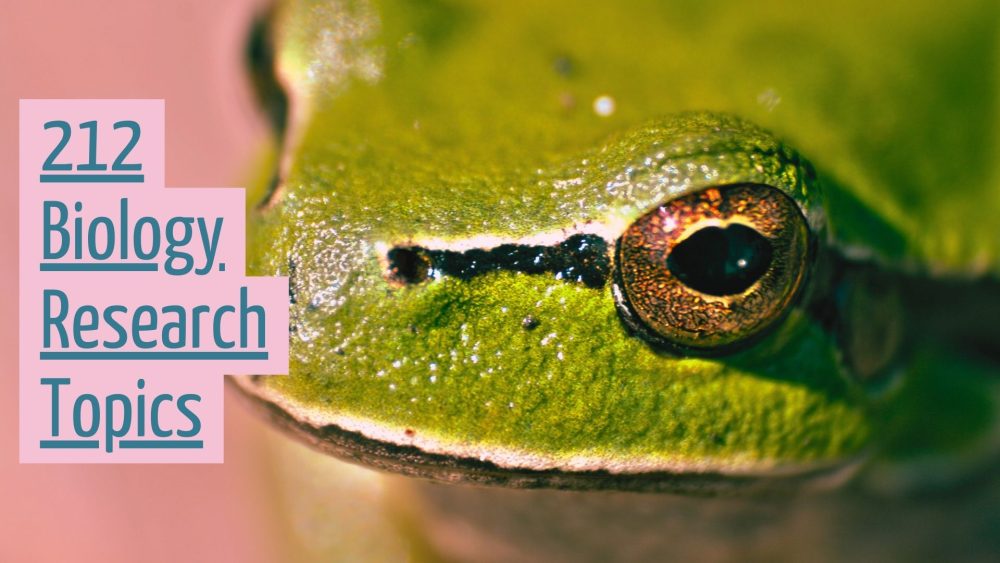
Every student studying something related to biology — botany, marine, animal, medicine, molecular or physical biology, is in an interesting field. It’s a subject that explores how animate and inanimate objects relate to themselves. The field unveils the past, the present, and what lies in the future of the relationship between the living and nonliving things.
This is precisely why you need custom and quality biology topics for your college and university essay or project. It’ll make it easy to brainstorm, research, and get to writing straight away. Before the deep dive, what is biology?
What Is Biology?
Everyone knows it’s the scientific study of life, but beyond that, biology facilitates the comprehension of living and nonliving things. It’s a branch that explores their anatomy, behavior, distribution, morphology, and physiology.
For example, it understands how genes are classified and constituted into generations. It encompasses various branches, including botany, medicine, genetics, ecology, marine biology, zoology, and molecular biology.
Here are what some of these mean:
Botany: This study of plants examines their structure, physiology, ecology, economic importance, and distribution, among others. It also deals with their biochemical processes, properties, and social interactions between plants. It extends to how plants are vital for human life, survival, and growth and how they play a significant role in stabilizing environmental health. Zoology: Zoology studies animal behavior, brain, structure, physiology, class, and distribution. It’s the general study of the lives of both living and extinct animals. It explains animal classification, the animal kingdom, evolution, habitat, embryology, and life span. Physiology: Physiology deals with the daily functions of the human body: How it works and the factors that make it work. It examines molecular behavior, the chemistry and physics behind locomotion, and how the cells in the living organisms’ body function. It helps understand how humans and animals get sick and what can be done to alleviate pain. Microbiology: Dealing with microorganisms, it examined how viruses, algae, fungi, bacteria, protozoa, and slime molds become parts of human life. They’re regarded as microbes, which play substantial roles in the human biochemical processes, including climate change, biodegradation, biodeterioration, food spoilage, biotech, and epidemiology. Marine Biology: This is the scientific study of organs in the sea. It understands their family classification, how they survive, and what makes wild marine animals different from domesticated and consumable ones. It also explores their interaction with the environment through several processes. The marine biologist studies marines in their natural environment, collects data on their characteristics, human impact on their living, and how they relate with themselves.
Now that you know all these, here are some custom biology topics to research for your university or college essay and paper.
Controversial Biology Topics
There are many controversial subjects in every field, and biology isn’t exempt from controversy. If you’d like to create an original essay through diverse opinions, here are biology topics for you:
- What are your thoughts on the post-Roe V Wade world?
- How can the post-Roe V Wade policy affect developing countries looking up to America for their laws?
- Abortion and feminism: discuss
- Does saving life justify cloning?
- Explain the principle of abortion in medical practice
- The effects of cloning in medicine
- How does genetics contribute to obesity?
- Explain why a parent could have Hepatitis B virus and only one of five offspring have the virus
- Is homosexuality really in the gene?
- How does depression correlate with genetics?
- Additives and how they affect the genes
- Examine how genetic mutations work
- Discuss the grounds that you could prove for legalizing human cloning
- Which is more immoral: Human or animal cloning?
- How is nanotechnology different from biotechnology?
- Discuss the manifestation of nanotechnology in science
- Explain three instances where public opinion has held back scientific inventions
- How does transgenic crop work?
- Would you say genetically modified food is safe for consumption?
- Explain why sexual abuse leads to trauma.
Biology Research Paper Topics
You’d need to write an extensive paper on biology one day. This could be when you’re in your final year in college or the university or submitting to a competition. You’d need Biology topics to research for brainstorming, and here are 30 of them:
- Stem cells and tissue formation processes
- Why are there different congenital disabilities?
- Mixtures in anticancer drugs?
- What are the complexities of existing HIV drugs?
- What is the contribution of chemotherapy to cancer?
- Examine the chemotherapy process and why it doesn’t work for some patients.
- Explain the origin of developmental diseases
- How do germs affect the cells?
- What are the consequences of the sun on the white person’s and black person’s skin?
- Why are some diseases treatable through drugs while some are not?
- Scientific lessons learned from COVID-19 and ideas to tackle the next virus
- If animals are carriers of the virus, what should be done to them?
- Examine five animals in extinction and what led to it
- Discuss the subject of endangered species and why people should care
- Is a plant-based diet sustainable for human health?
- Account for the consequence of living on Mars on human health
- Discuss the inconveniences involved in space travel
- How does space flight contribute to environmental disasters
- Discuss the emergence of leukemia
- Explain how the immune systems in humans work
- Evaluate the factors that weaken the immunological system
- What would you consider the deadliest virus?
- Autoimmune: what is it, origin and consequences
- Immune disorder: origin and how it affects the body
- Does stress affect the ability to have sex?
- Contribution of vaccine to eradicating disease: Discuss
- What are the complexities in taking the Hepatitis B vaccine while being positive?
- Allergies: why do humans have them?
- DNA modification: how does it work?
- Explain the misconceptions about the COVID-19 vaccines.
Interesting Biology Topics
Biology doesn’t have to be boring. Different aspects of biology could be fun to explore, especially if you’ve had a flair for the study since your elementary school classes.
You can either write an essay or paper with the following interesting biology research topics:
- Human emotions and conflicts with their intellectual intelligence
- Emotions: Its influence on art and music and how the perception of art influences the world
- The consequences of marijuana and alcohol on teenagers
- Compare and contrast how alcohol affects teenagers and adults
- Discuss the contributions of neuroscience to the subject of emotional pain
- Explain how the brain process speech
- Discuss the factors that cause autism
- Explain what is meant when people say humans are animals
- Why do scientists say humans are pessimists?
- Factors contributing to the dopamine levels human experience
- How does isolation affect the human brain?
- What factors contribute to instinctive responses?
- Noise pollution: how it affects living organisms
- Fire ecology: The contributions of plants to fire outbreak
- Explain the science behind how hot temperature, soil, and dry grass start a fire
- Microbes: what do you understand by bioremediation?
- Explain urban ecology and the challenges it pokes to solve
- Discuss how excessive internet usage affects the human memory
- Evaluate how conservation biology contributes to the extinction prevention efforts
- Discuss the role of satellites and drones in understanding the natural world
- Why do we need space travel and studies?
- Explain the limitations of limnology studies
- What are infectious-disease-causing agents all about?
- Discuss what epigenetics studies encompass
- Why is cancer research essential to the world?
- Discuss climate change: Governments are not interested, and there is no alternative
- How is behavioral science studies a core part of the understanding of the world?
- Discuss the issues with genetic engineering and why it’s a challenge
- Evaluate the strengths and weaknesses in the arguments for a plant-based diet
- Create a survey amongst students of biology asking why they chose to study the course.
Biology Research Topics For College Students
If you find any of the above beyond your intellectual and Research capacity, here are some topics you can handle. You can use these for your essays, projects, quizzes, or competitions.
These custom yet popular biology research topics will examine famous personalities and other discourse in biology:
- Effects of the human hormone on the mind
- Why do men get erect even when they’re absentminded?
- How does women’s arousal work?
- How can melatonin be valuable for therapy?
- Risky behavior: Hormones responsible for the risk
- Stem and cloning: what is the latest research on the subject?
- Hormones: changes in pregnancy
- Why do pregnant women have an appetite for random and remote things?
- The role of physical activities in hormone development
- Examine the benefits and threats of transgenic crops
- The fight against COVID-19: assess current successes
- The fight against smallpox: assess current successes
- The fight against HIV: history, trends, and present research
- Discuss the future of prosthetic appliances
- Examine the research and the future of mind-controlled limbs
- What does cosmetic surgery mean, and why is it needed?
- Analyze the meaning and process of vascular surgery
- Discuss the debate around changes in genital organs for males and females in transgender bodies
- How do donors and organ transplants work?
- Account for the work of Dr. Malcom E Miller
- Discuss the contribution of Charles Darwin to human evolution
- Explain the trends in biomedicine
- Discuss the functions of x-rays in botany
- Assess the most efficient systems for wildlife preservation
- Examine how poverty contributes to climate hazards
- Discuss the process involved in plant metabolism
- The transformation of energy into a living thing: discuss
- Prevention for sexually transmitted disease: What are the misconceptions?
- Analyze how the human body reacts to poison
- Russian Poisoning: What are the lessons scientists must learn?
- COVID-19: Discuss the efforts by two or three governments to prevent the spread
- Discuss the contributions of Pfizer during the pandemic.
Marine Biology Research Topics
This subject explains orgasms in the sea, how they survive, and their interaction with their environment. If you have a flair for this field, the following Biology research topics may interest you:
- Discuss what quantitative ecology through modeling means
- Smallest diatoms and marine logistics: discuss
- How is the shark studied?
- Acidification of seas: Causes and consequences
- Discuss the concept of the immortality of Jellyfishes
- Discuss the differences between seawater and freshwater in marine study
- Account for some of the oldest marine species
- Discuss the evolution of the deep sea
- Explain whales’ communication techniques
- What does plankton ecology encompass?
- The importance of coral reefs to seawater
- Challenges that encompass geological oceanography
- How tourism affects natural animal habitat
- Discuss some instances of the domestication of wild marine animals
- Coastal zone: pros and cons of living in such areas
- How do sharks perceive enemies?
- Analyze why some animals can live in water but can’t live on land
- Explain how plants survive in the sea
- Compare and contrast the different two species of animals in the water
- How can marine energy be generated, stored, and used?
Molecular Biology Research Topics
Focusing on the construct of cells and analysis of their composition, it understands the alteration and maintenance of cellular processes. If you’d like to focus on molecular biology, here are 15 good biology research topics for you:
- Ethical considerations in molecular genetics
- Discuss the structure and component of the gene
- Examine the restrictions in DNA
- What are the peculiarities in modern nucleic acid analysis
- What goes into the Pharmaceutical production of drugs
- Evaluate the building blocks of life
- Discuss the systems of RNA translation to protein
- PCR: How DNA is tested and analyzed
- Why is prion disease so dangerous?
- Compare and contrast recessive genes vs. dominant genes
- Can there be damage to the human DNA, and can it be repaired?
- Constraints in the research of microarray data analysis
- Protein purification: How it evolves
- Objectives of nucleic acid
- Explain the structure of a prion.
Biology Research Topics For High School
Your teachers and professors will be awed if you create impeccable essays for your next report. You need to secure the best grades as you move closer to graduation, and brainstorming any of these popular biology research topics will help:
- Identify the most endangered species
- The challenges to animal extinction
- What are the things everyone should know about sea life?
- Discuss the history of genetics
- Explain the biological theory of Charles Darwin
- How did the lockdown affect social interaction?
- Why do some people refuse the vaccine?
- Origin of genetics
- What is animal hunting, and why is it fashionable
- Explain the evolution of a virus
- Role of lockdown in preventing deaths and illnesses
- Invasive species: What does it mean?
- Endangered animals: How do they survive in the face of their hazards?
- Lockdown and their role in reducing coronavirus transmission
- Vaccine distribution: Ideas for global distribution
- Why can viruses become less virulent?
- Discuss the evolution of the world
- Explain the evolution of the planet
- Explain what Elon Musk means when he says life on Mars is possible
- What does herd immunity mean?
- Flu: why is there a low incidence in 2020?
- Relationship between archaeology and biology
- Antiviral drug: What it means
- Factors leading to the evolution of humans
- Give instances of what natural selection means
- What is considered the dead branches of evolution
- Whale hunting: What it means and the present trends
- Who is Stephen Jay, and what is his role in paleontology?
- Origin of diseases: why must humans fall sick?
- Why are humans called higher animals?
Human Biology Research Topics
Human biology understands humans and their relationship between themselves and their environment. It also studies how the body works and the impediments to health. Here are some easy biology research topics to explore on the subject:
- How do gut bacteria affect the brain?
- What are the ethical concerns around organ transplants?
- The consequence of alcohol on the liver
- The consequences of extreme salt on the human body
- Why do humans need to deworm regularly?
- The relationship between obesity and genetics
- Genetically modified foods: Why are they needed?
- How sun exposure affects human skin
- Latest trends: Depression is hereditary
- Influence of music on the human brain
- What are the stages of lung cancer
- Forensic DNA: latest trends
- How visual consumptions affect how humans think
- What is the process that leads to pregnancy?
- Explain the role of nanotechnology in HIV research
- Discuss any experiment with stem cells you know about
- Explain how humans consume food
- Discuss the process of metabolism as well as its criticality to human health
- Explore the consistent challenges technology poses to human health
- Explain the process of body decay to a skeleton.
Cell Biology Research Topics
There are many evolutionary biology research paper topics formed not by the nomenclature but for what they stand for. Cell biology is one of the most complex branches of the field.
It examines minor units and the living organisms that make them up. The focus is on the relationship between the cytoplasm, membrane, and parts of the cell. Here are some topics to explore for your scientific dissertation writing :
- How does chromatin engage in the alterations of gene expression?
- What are the usual cell infections, and why does the body have immunity defections?
- Identify and account for the heritage of Robert Brown in his core career focus
- Explain the structure of the animal cell and why It’s what it is
- Identify the cells in the human body as well as their functions
- Explain a scenario and justify the context of animals photosynthesizing like plants
- Why do bacteria invade the body, and how do they do it?
- Why are mitochondria considered the powerhouse of the cell
- Use the molecular analysis tool to explain multicellular organisms
- Examine how the White blood cells fight disease
- What do you understand about the role of cell biology in the treatment of Alzheimer’s Disease
- What are the latest research methods in cell biology?
- Identify the characteristics of viruses and why they threaten human existence.
- Discuss the differences between DNA and RNA
- What part of the body is responsible for human functionality for as long as the individual wants?
Get Biology Research Help As Soon As Possible
Creating the best essays or papers is easier now that you have custom biology research topics. However, you may still need support writing your paper beyond these topic ideas. After all, the first stage of writing like experts is brainstorming ideas and researching which is most feasible to write about.
If you truly want to wow your professor or teacher but can’t afford to dedicate all the required time, here’s an alternative. You can hire writing helpers online for quality papers at a cheap price, and we can help with that. We are a team of writers with many years of writing experience for students in Europe and North America. You can even buy thesis online with us, as well as editing services.
Each paper is assigned to writers with expertise in a specific field. This enables them to provide in-depth analysis as your assignment requires. We’re based online, which means you won’t have issues with accessibility and availability. Just tell us what you need, and we will get it done.

Leave a Reply Cancel reply
Your email address will not be published. Required fields are marked *
Comment * Error message
Name * Error message
Email * Error message
Save my name, email, and website in this browser for the next time I comment.
As Putin continues killing civilians, bombing kindergartens, and threatening WWIII, Ukraine fights for the world's peaceful future.
Ukraine Live Updates
Verify originality of an essay
Get ideas for your paper
Cite sources with ease
200+ Fascinating Biology Research Topics for Students in 2024
Updated 24 Jul 2024

Finding a great topic for a study can be challenging. Interesting biology topics need to be appealing, attention-grabbing and academically relevant. They need to deal with the recent findings and debatable questions. A great topic is a base of a scientific argument that has a valuable idea for the science. It also should provoke further discussion and lead to further coming studies.
College students have a hard time choosing the fascinating subject for their paper. That’s why these biology research paper topics can give you inspiration. You can pick one for your research or use them as the base for building your own idea.
Read also: How to Write an Introduction to a Research Paper
A List of Researchable Topics for Biology
A list of researchable topics for biology students starts with several interesting biological topics concerning sociological perspective and ethical issues. The most debatable subjects are abortion, human cloning, genetic researches and the new ethics that should be created to resolve these issues.
Get your paper in 3 hours!
- Customized writing: 100% original, personalized content.
- Expert editing: polished, standout work.
✔️ Zero AI. Guaranteed Turnitin success.

What are some good biology research topics?
One could also find good research topics related to traditional biology subfields like plant and animal biology, ecology (current global problems warrant a number of hot topics), or topics related to humans: neurobiology (and determinants of human behavior), recent discoveries on diseases and the immune system, etc.
What are the major biological issues today?
They include pollution challenges, overpopulation, an increase in infectious diseases, and the lack of transparency in DNA and synthetic biology studies. We also have biological issues like global warming, endangered species, stem cell research, and the acidification of the ocean.
Read also: How can I find a trusted service to write my research paper ?
Biology Research Topics for College Students
When you choose a competitive Biology subject, you must focus on ideas that inspire you and talk about morphology, physiology, cell studies, origins, distribution, and innovations related to living organisms. You can also talk about the plants, the animals, or even famous personalities in the field.
- Developmental Biology and Aging: Exploring New Discoveries in Lifespan Extension Research
- The Role of Microbiomes in Ecosystem Health: A Look into the Microscopic Regulators of Ecological Balance
- CRISPR and Beyond: Advanced Genetic Editing Techniques Emerging in 2023
- Bioengineering and Sustainability: Harnessing Synthetic Biology for a Greener Future
- Revolutionizing Drug Discovery with Synthetic Biology: Progress and Prospects in 2023
- Challenges and Ethical Implications of Synthetic Biology: A Thorough Discussion on Genetically Modified Organisms
- The Use of The Advanced X-Ray for The Scanning of The Plants
- The Pros and Cons of The Cryo-EM Pattern in Virology
- The Use of 3D Models for The Microscopic Examination of Living Cells
- The Heritage of Jose Rizal and The Experiments Related to The Garden in Dapitan
- Understanding the Role of Epigenetics in Human Development: Current Research and Perspectives
- Heredity and Genetics Through The Lens of Autism: The Theories
- Novel Approaches to Conservation: How Modern Ecological Research Aids in Species Preservation
- Genetic Engineering and The Modern Survival of Life Mechanisms
- How Can The Energy Be Transformed Into Living Things
- Immune System of The Dolphins Compared to The Whales
- Primary Productivity in a Limited Ecosystem: The Role of The Social Community
- The Production of Hormones Without an Endocrine System: The Metabolism of The Plants
Abortion, Human cloning, Genetic Researches Biology Topics
- Presentation on Abortion Law & Society’s Perspective in the USA
- How Abortion is Related to the Feminist Ideology
- The Biological Insights of Abortion
- Human Cloning & Transplantation Possibilities
- Project on Different Types of Cloning
- DNA Structure, Genetic Disorders, and Modern Technology
- History and Development of Human Cloning Science
- Cloning: The Moral Aspect
- How Cloning Can Change Medicine
- What We Actually Know About DNA-modified Organisms
- The Influence of Genetics on Disease Susceptibility: Current Research in Personalized Medicine
- Genetic Grounds for Obesity
- Is Homosexuality Genetically Based?
- How Addictive Substances Affect Our Genes
- Depression & Genes
- Are Genetically Modified Foods Safe?
- Should Human Cloning Be Legal?
- The Advantages of Transgenic Crops
- Factors Contributing to Genetic Mutations
- Organ Transplantation: Is Donor’s Consent Needed?
- Ethics Behind Transplantation
- How Public Opinion Holds Back the Scientific Progress
DNA Research Topics
- The Pros and Cons of Family Genetic Testing: Mental Implications and The Abuse of Data
- Unraveling the Secrets of Junk DNA: New Insights into Non-Coding Regions and Their Roles
- Structured Controversy of DNA Alterations: What Ethical Principles Must be Followed
- Should DNA Alternation be Made Available when no Genetic Diseases are Involved?
- Inhibitors of Bacterial DNA and Resistance Mechanisms
- Bio-nano Technologies and The Covid-19 Pandemic: What Have We Learned
- Should DNA Research be Conducted on Animals and Plants: The Dangers Ahead
- Various Genetic Diseases and The Use of DNA Sequencing
- The Pros and Cons of The Protein-coding Approach to Regulatory Regions
- An Ethical Side of Selective Breeding and Damage to Reproductive Technologies
- Embryo Screening and Cloning: The Bioethical Aspect of Research
- DNA Modifications in Humans
- Can DNA Change Beat Aging?
Need more writing assistance?
Connect with our top writers and receive a paper sample on biology crafted to your needs.
Behaviour and Hormones Biology Research Topics
Another huge part of biology research essay topics deals with the question of behavior and hormones. Students can share ideas on how our hormones influence mood and well-being. They can also be related to some disorders.
- Report on the Significance of Certain Hormones Concerning the Body Functioning
- Cell Structure & Antibiotic Resistance
- Hormones Influence on Mind and Behavior
- How Hormones Contribute to Depression
- Hormonal Changes During Pregnancy
- Psychological Disorders: The Biological Basis
- Biology Behind the Bipolar Disorder
- Cortisol and Testosterone Influence Risk-Taking
- Current Oxytocin Science
- Oxytocin and Fear Reaction
- Endocrine-Related Diseases
- How Hormones Affect Human Behavior
- Hormonal Control of Reproductive System
- Influence of Hormonal Therapy
- Endocrinology and Metabolism
- Hormone-Specific Psychopathic Disorders
- Melatonin in Therapy
- Steroid Hormones’ Path to Cells
- Cardio Exercise Influence Hormones
- Oxytocin in Treatment Psychopathic Disorders
- How Hormones Influence Women’s Mental Health
- Gender Specifics Related to Mental Health
Read also: 100 The Most Impressive Social Issues Topics for Essay or Paper
Immune System Biology Research Topics
Biology topics to write about cannot be full without at least several ones dealing with the immune system. It is our main defense against different diseases, that’s why it is important to know more about it.
- Human Immune System and Its Resistance Capabilities
- How Do Immune System Agents Function?
- Discovering Diseases Caused by Immune System not Functioning Good
- Immunity & Stress
- Tolerance & Autoimmunity
- Asthma & Allergic Reactions
- Immunotherapy Influence on Human Body
- Immunology & Transplantation
- Graft Rejection Prevention
- Vaccination: Are There Any Real Benefits?
- The Society’s Perspective on Vaccination
Cell Biology Research Topics
It is a complex branch of biology that studies the smallest units and the living organisms. The focus is on the parts of the cell and the interaction of the cytoplasm and the membrane as the topic ideas below show:
- The Pros And Cons Of The Cytoskeleton System Through The Lens Of Cell Motility.
- Investigating Cellular Dynamics in Early Human Development: Cutting Edge Techniques and Discoveries in 2023.
- Analysis Of Cell Division And The AI-based Methods Of Cell Cycle Control.
- The Role Of Chromatin In The Alterations Of Gene Expression.
- What Causes Cellular Metabolism In Marine Mammals.
- The Use Of Hormone Action Therapy In College Athletics.
- The Most Common Cell Infections And The Immunity Challenges.
- The Alteration Of Ribosomes And The Cell Membrane Functioning.
- The Heritage Of Robert Brown And The Nucleus.
- The Importance Of The Cork Tree Cell For Cell Biology.
- Analysis Of Multicellular Organisms And The Use Of Molecular Analysis Tools.
Molecular Biology Research Topics
The branch of Molecular Biology focuses on the analysis of composition, structure, and complex interactions related to processes taking place in the cells. Unlike basic microbiology, it studies biological processes like alteration, recreation, and maintenance.
- The Use Of Comparative Genomics Of The Human Being And The Mice.
- The Restrictions Of The DNA And Peculiarities Of The Modern Nucleic Acid Analysis.
- An Ethical Aspect Of Molecular Genetics.
- The Most Efficient Methods Of RNA Translation Into Proteins.
- What Is The Current State Of The DNA Replication And The Amplification Methods.
- The Limitations Of The Microarray Data Analysis.
- Is It Possible To Repair The Damage Done To The Human DNA?
- The Pros And Cons Of The Aseptic Technique: Transfection Methods.
- Purification Of The DNA: How Does Protein Purification Change Over Time?
- What Are The Objectives Of The Nucleic Acid Hybridization During The Gene Cloning Process?
Plant Pathology Biology Research Topics
Here are several interesting biology research topics concerning plant pathology:
- Natural Disease Resistance in Plants
- The Prevention Measures in Plant Pathology
- Research on Plant-Associated Microbes and Current Genomic Tools
- Literature Review on Microbial Ecology and Evolution
- Plant Diseases Management Facilitated by Modern Technology
- Plant Evolutionary Genetics
- Weedy & Invasive Plants
- Photosynthesis: Aspects & Functions
- Fertilizers’ Influence on Plants
- The Impact of Climate Change on Plant Disease Patterns
- Genetic Engineering for Disease Resistance in Crops
- Biocontrol Methods in Managing Plant Pathogens
- The Role of Soil Microbiome in Plant Disease Suppression
- Emerging Fungal Pathogens in Agricultural Crops
- Plant-Virus Interactions and Disease Management
- The Effects of Pesticides on Non-Target Plant Pathogens
- Detection and Diagnosis of Plant Pathogens Using Molecular Techniques
- Epidemiology of Plant Diseases in Changing Agricultural Landscapes
- Resistance Mechanisms in Plants Against Bacterial Pathogens
- The Impact of Invasive Species on Plant Disease Dynamics
Ecology-concerning Subjects Biology Research Topics
Undergraduates can do a proposal on Ecology-concerning subjects. First, it is one of the most relevant scientific fields as we deal with the results of human behavior all the time. Any new cool paper can shed some light of new ideas that will contribute to making the world a better place.
- Ecological and Evolutionary Factors Influencing Animal Behavior
- Essay on Relationship Between Living Forms and Their Environment
- The Affect of Human Behavior on Animal Forms in the USA
- The Ways Animal and Plants Respond to Changing Environment
- Developmental Mechanism of Resistance in Animals
- The Environmental Change and its Involvement in the Diversity of Species
- Is Global Warming Really a Threat?
- Fast Food Industry & Tropic Forests Extinction
- Environmental Psychology
- Means of Wildlife Protection
- Impact of Rain Forests Extinction
- Rare Species Protection
- The Problem of Extinction
- Renewable Energy and Environment’s Pollution
- Climate Change and Biodiversity
- Types of Pollution in Modern World
- What is Sustainability in Biology?
- Non-human factors of Extinction of Species
- Benefits of Ecotourism
- Is Extinction of Bees Real?
- Oil Spill Effects on Ocean Wildlife
- Factors and benefits of Organic Farming
Neurobiology Research Topics

- Visual Cortex & Models of Orientation
- Neuroscience in Robotic Technologies
- What is Visual-Motor Coordination Based On?
- Impact of Music on Human Brain
- Brain Injuries and Related Disorders
- Brain and Memory
- Brain Capabilities of Self-Repairing
- Genetic Defect That Contributes to Schizophrenia
- Factors and Causes Behind a Migraine
- Connection Between Gut Bacteria and Anxiety
- Can Gut Bacteria Contribute to Depression?
- Cognitive Neuroscience on Problem-Solving
- Genes and Proteins Responsible for Neurons functioning
Evolutionary Biology Research Topics
As the title implies, evolutionary biology focuses on the processes that explore the history of life forms that we encounter. Starting with the study of the natural habitats to the analysis of the biodiversity and related behaviors, it's one of the most fascinating and varied branches of Biology.
- The Natural vs Forced Evolutionary Processes as Natural Selection Takes Place
- How Can We Increase Human Awareness about The Importance of Diversity of Life on Earth
- The Heritage of Charles Darwin and Why His Theories are Still Relevant Today
- The Evolutionary Biology Processes Through The Lens of The Invertebrates
- How Do Ecology and Evolution Affect The Presence of Infectious Diseases
- Human Learning Processes and The Use of AI-based Models to Predict Evolution
- The Theory of Gene Migration and The Philosophical Importance of Spiritual Freedom
- The Importance of Evidence for The Evolution Processes: Our Common Ancestors
- What Types of Changes are Considered an Evolution When a Gene Pool Is Involved?
- Individualism as The Form of The Forced Evolution: An Ethical Aspect
Animals Biology Research Topics
Here are fascinating biology research topics related to animals. They are quite popular among students. You can submit several papers dwelling on deep analysis of one phenomenon or species.
- Factors Concerning Animal Growth
- The Obesity in Home Pets
- Traditional Dog Diet and Modern Home Pets
- Male Pregnancy Among Animals
- Is Beauty Products Testing on Animals Ethical?
- Birds Behavioral Study
- Animal Science & Food Sustainability
- Does Veganism Actually Influence Meat Production?
- Wild Animal Projects
- Fashion Industry & Animal Abuse
- Camouflage Mechanism in Sea Animals
- Discovering Primate Language and Cognitive Function
Read also: Your personal lab report writing service - EduBirdie!
Marine Biology Research Topics
Marine biology relates to a mixture of Biology, Chemistry, and Physics as one studies marine organisms and their behavior patterns. As marine biologists study how they interact with the environment, they use oceanography and relevant skills based on Chemistry, Physics, and Geology.
- The Salish Sea Ecology and The Use of Corals for The Understanding of Tropical Peculiarities
- The Challenges Of Quantitative Ecology Through The Lens Of Modeling
- How Can Marine Animal Behavior Be Adapted To A Certain Genetical Pool?
- Geological Oceanography: What Are The Challenges Related To Physical Limitations?
- Comparison Of The Smallest Diatoms And Their Marine Logistics
- Tourism And The Changes To The Coral Reef Ecology In 2022
- Marine Engineering And The Use Of Flexible Aquaculture
- Development Of Alternative Feeds For The Dolphins And The Tracking Systems
- What Are The Pros And Cons Of The Coastal Zone Management Currently Used In The United States?
- Biochemistry Of The Red Sea Compared To The Sea Of Azov
- The Effects of Ocean Acidification on Coral Reefs
- Marine Biodiversity in Deep-Sea Ecosystems
- The Impact of Plastic Pollution on Marine Life
- Conservation Strategies for Endangered Marine Species
- The Role of Mangroves in Coastal Ecosystems
- Marine Biotechnology and its Applications
- The Effects of Climate Change on Marine Migration Patterns
- Sustainable Fishing Practices and Marine Ecosystems
- Marine Microorganisms and their Role in the Ecosystem
- The Impact of Human Activities on Coastal Habitats
Topics on the History of Biology
There also easy issues related to the history of Biology. You can dwell on the capstone of modern science or dwell on an understanding of one crucial academic term.
- The History of Genetics
- Darwin’s Theory and Biology
- Discovering Evolution Factors
- How Archeology Impacts Animal Biology?
- Natural Selection Theory: The Discovery and Its Impact
- Effects of Whale Hunting
- Dead Branches of Evolution
- Famous Biologist Antonie van Leeuwenhoek
- Edward Jenner and the History of Vaccination
- Rachel Carson’s Perspective on Environmental Safety
- Stephen Jay Gold’s Paleontology: How History and Biology are Combined
- The Development of Cell Theory and its Impact on Biology
- Contributions of Charles Darwin to Evolutionary Biology
- The History of Genetics: From Mendel to Modern Genomics
- The Discovery and Significance of DNA Structure
- The Role of Women in the Advancement of Biology
- The Evolution of Microbiology and the Discovery of Microorganisms
- The Impact of Technology on the Progress of Biological Sciences
- Historical Perspectives on Human Anatomy Studies
- The Development of Ecological Theory and Conservation Biology
This list ends with several other fascinating research proposal topics, such as:
- Molecular and Genome Evolution
- Comparative Genomics
- The Evolutionary Biology of Infectious Diseases
- Modern Technology and Scientific Tools in Biology
- Neurobiological Explanation of Sleep
- Symbiosis in Parasites
- Metabolism & Physical Exercise
How do you choose a research topic?
When choosing a research topic, it's crucial to consider your own curiosity and passion in the subject matter. This personal connection not only makes the research process more engaging but also often leads to more diligent and thorough work. Additionally, the topic should have a significant impact or relevance in the current state of the field. This involves considering the interests of potential readers or the audience, ensuring that the topic is not only of personal interest but also of broader academic or societal importance.
Furthermore, the selection process should involve an assessment of the current state of knowledge in the field. This includes reviewing recent advances, perspective-changing publications, and ongoing debates within the discipline. A good research topic often lies at the intersection of what is currently known and the unexplored or less understood aspects of the field. By focusing on these areas, your research paper examples can contribute to the advancement of knowledge, offering new insights or solutions to existing problems. In summary, the ideal research topic is one that sparks personal interest, addresses a gap or a pressing question in the field, and has the potential to contribute meaningfully to the broader academic community.
Read also: If you are willing to pay someone to write a research paper , let professionals write it for you.
Start to Write Well-Grounded Biology Research
These Biology research paper topics were compiled for anyone from high-school and undergraduate students to anyone who has to deal with Biology for any reason. It all depends on the size and depths of your project, that is why you may need a proper research paper help . The topics concern the most relevant and appealing part of biological science. Start working on your thesis with reading academic literature and don't forget to ask for thesis writing help at EduBirdie. A proper review of recent publications will help you build up an argument. Always remember that the key to any of your projects is having fun. So choose the topic that you are passionate about, and go for it!
Was this helpful?
Thanks for your feedback.

Written by David Kidwell
David is one of those experienced content creators from the United Kingdom who has a high interest in social issues, culture, and entrepreneurship. He always says that reading, blogging, and staying aware of what happens in the world is what makes a person responsible. He likes to learn and share what he knows by making things inspiring and creative enough even for those students who dislike reading.
Related Blog Posts
Top 300+ ideas for research paper topics in 2024.
Table of contents College Research Paper Topics Health Research Paper Topics Education Research Paper Topics Environmental Research...
Chemistry Research Topics That Will Knock You Off Your Feet
Finding suitable chemistry research topics is not an easy task to accomplish, especially if one struggles with several topic ideas or looks at bord...
How to craft research objectives: guidelines & tips
In the ever-evolving landscape of academic study, having clear and well-defined research objectives is crucial for the success of any work. Study a...
Join our 150K of happy users
- Get original papers written according to your instructions
- Save time for what matters most
- Privacy Policy

Home » 350+ Biology Research Topics
350+ Biology Research Topics

Biology is a vast field of study that explores the diverse aspects of life, from the smallest organisms to the complex ecosystems they inhabit. With new discoveries being made every day, the field of biology is constantly evolving and expanding. As a result, there are numerous research topics within biology that can capture the imagination of students, researchers , and professionals alike. Whether you’re interested in genetics, ecology, microbiology, or any other subfield of biology, there is no shortage of fascinating topics to explore. In this post, we will discuss some of the most compelling biology research topics that you can delve into.
Biology Research Topics
Biology Research Topics are as follows:
- The role of gut microbiota in human health and disease.
- The effects of climate change on animal behavior and physiology.
- The molecular mechanisms of cancer development and progression.
- The evolutionary origins of human language.
- The impact of pesticides on insect populations and ecosystems.
- The genetic basis of aging and longevity.
- The ecological importance of microbial communities in soil.
- The physiology and behavior of marine mammals.
- The molecular mechanisms of viral infections.
- The evolutionary history of flowering plants.
- The ecological impacts of invasive species.
- The role of epigenetics in gene regulation and disease.
- The evolution of social behavior in animals.
- The physiology and ecology of birdsong.
- The impact of antibiotics on gut microbiota and human health.
- The role of the microbiome in psychiatric disorders.
- The evolutionary history of human migrations.
- The ecological and physiological effects of light pollution on animals.
- The mechanisms of cell division and differentiation.
- The ecological impacts of deforestation.
- The molecular mechanisms of drug addiction.
- The genetic basis of plant resistance to pests and diseases.
- The evolutionary history of human diet and nutrition.
- The molecular mechanisms of neurodegenerative diseases.
- The ecology and evolution of sexual selection.
- The physiological and behavioral effects of air pollution on animals.
- The role of epigenetics in plant development and stress response.
- The evolutionary history of animal domestication.
- The molecular mechanisms of genetic diseases.
- The ecological impacts of climate change on plants.
- The evolutionary history of human mating systems.
- The physiological and behavioral effects of noise pollution on animals.
- The genetic basis of intelligence and cognitive abilities.
- The ecological and physiological effects of ocean acidification on marine organisms.
- The molecular mechanisms of immune system function and dysfunction.
- The evolutionary history of human social structures.
- The ecological impacts of plastic pollution on marine ecosystems.
- The genetic basis of animal migration.
- The physiological and behavioral effects of light and dark cycles on animals.
- The ecological and evolutionary dynamics of symbiosis.
- The molecular mechanisms of gene regulation and expression.
- The evolutionary history of human disease resistance.
- The ecological impacts of overfishing on marine ecosystems.
- The genetic basis of animal communication.
- The physiological and behavioral effects of temperature changes on animals.
- The ecological and evolutionary dynamics of parasitism.
- The molecular mechanisms of circadian rhythms.
- The evolutionary history of human social cognition.
- The ecological impacts of urbanization on wildlife.
- The genetic basis of antibiotic resistance in bacteria.
- The impact of climate change on insect population dynamics.
- The role of the microbiome in the development of autoimmune diseases.
- The genetic basis of complex human diseases such as diabetes and heart disease.
- The evolution of plant secondary metabolites and their ecological functions.
- The effects of anthropogenic noise on animal communication and behavior.
- The molecular mechanisms of protein synthesis and folding.
- The role of RNA in gene expression and regulation.
- The ecology and evolution of microbial symbioses in plants.
- The physiological and behavioral effects of air temperature changes on animals.
- The genetic basis of crop domestication and improvement.
- The evolution of reproductive strategies in animals.
- The impacts of plastic pollution on terrestrial ecosystems.
- The molecular mechanisms of stem cell differentiation and regeneration.
- The ecological dynamics of predator-prey interactions.
- The role of gut microbiota in the regulation of host metabolism.
- The genetic basis of host-pathogen coevolution.
- The evolution of social cognition and cooperation in animals.
- The ecological and physiological effects of wildfires on ecosystems.
- The molecular mechanisms of transcriptional regulation in eukaryotic cells.
- The role of microorganisms in soil nutrient cycling and ecosystem functioning.
- The genetic basis of plant-pathogen interactions.
- The ecology and evolution of microbial communities in the ocean.
- The physiological and behavioral effects of water pollution on aquatic organisms.
- The molecular mechanisms of protein degradation and turnover.
- The impact of urbanization on pollinator populations and plant-pollinator interactions.
- The genetic basis of insecticide resistance in pests.
- The evolution of animal cognition and perception.
- The ecological and evolutionary dynamics of host-parasite interactions.
- The role of epigenetic modifications in plant adaptation to environmental stress.
- The physiological and behavioral effects of endocrine disruptors on animals.
- The molecular mechanisms of DNA replication and repair.
- The impact of ocean warming on coral reef ecosystems.
- The genetic basis of animal personality traits.
- The ecology and evolution of microbial symbioses in animals.
- The physiological and behavioral effects of light quality on plants.
- The molecular mechanisms of RNA editing and splicing.
- The role of microbial communities in plant-pathogen interactions.
- The ecological and evolutionary dynamics of seed dispersal.
- The genetic basis of animal coloration and pattern.
- The impact of climate change on plant phenology and productivity.
- The molecular mechanisms of signal transduction in cells.
- The role of microbial communities in the human gut-brain axis.
- The ecology and evolution of animal migrations.
- The physiological and behavioral effects of chemical pollution on animals.
- The genetic basis of animal development and morphogenesis.
- The evolution of animal social behavior and communication.
- The ecological dynamics of plant-pollinator networks.
- The molecular mechanisms of intracellular trafficking and transport.
- The role of microbial communities in the degradation of pollutants.
- The ecological and evolutionary dynamics of species interactions in ecological communities.
- The role of epigenetics in cancer development and progression.
- The molecular basis of antibiotic resistance in bacteria.
- The impact of climate change on biodiversity and ecosystem functioning.
- The genetic basis of aging and age-related diseases.
- The evolution of social organization in primates.
- The ecological dynamics of plant-fungal interactions.
- The role of microbiota in immune system development and function.
- The molecular mechanisms of DNA damage and repair.
- The physiological and behavioral effects of climate change on marine organisms.
- The genetic basis of human variation and diversity.
- The evolution of sexual selection and mate choice in animals.
- The ecological and evolutionary dynamics of species invasions.
- The role of microbiota in brain function and behavior.
- The molecular mechanisms of immune system activation and regulation.
- The physiological and behavioral effects of pollution on wildlife.
- The genetic basis of behavioral disorders and mental illness.
- The evolution of plant-pollinator mutualisms.
- The ecological dynamics of predator-prey coevolution.
- The role of microbiota in metabolic diseases such as obesity and diabetes.
- The molecular mechanisms of protein-protein interactions and signaling.
- The genetic basis of complex traits such as intelligence and personality.
- The evolution of animal communication and language.
- The ecological and evolutionary dynamics of mutualistic interactions in ecological communities.
- The role of microbiota in the development and maintenance of gut homeostasis.
- The molecular mechanisms of neurotransmitter synthesis and release.
- The physiological and behavioral effects of artificial light at night on wildlife.
- The genetic basis of developmental disorders such as autism and ADHD.
- The evolution of host-parasite coevolution and adaptation.
- The ecological dynamics of plant-herbivore interactions.
- The role of microbiota in the regulation of metabolism and energy balance.
- The molecular mechanisms of membrane transport and signaling.
- The physiological and behavioral effects of habitat fragmentation on wildlife.
- The genetic basis of circadian rhythms and sleep disorders.
- The evolution of animal cognition and decision-making.
- The ecological and evolutionary dynamics of trophic cascades.
- The role of microbiota in the development and function of the respiratory system.
- The molecular mechanisms of epigenetic inheritance.
- The physiological and behavioral effects of endocrine disruptors on wildlife.
- The genetic basis of developmental plasticity and adaptation.
- The evolution of animal social learning and culture.
- The ecological dynamics of predator-prey interactions in aquatic systems.
- The role of microbiota in the regulation of host immunity and inflammation.
- The molecular mechanisms of RNA interference and gene silencing.
- The physiological and behavioral effects of climate change on migratory animals.
- The genetic basis of drug addiction and substance abuse disorders.
- The evolution of animal cooperation and conflict resolution.
- The ecological and evolutionary dynamics of niche construction.
- The role of microbiota in the regulation of host-microbe interactions.
- The molecular mechanisms of gene regulation by non-coding RNAs.
- The role of epigenetics in gene expression and regulation.
- The molecular mechanisms of DNA damage response and repair.
- The impact of environmental toxins on human health.
- The evolutionary origins of viruses and their impact on hosts.
- The genetics of aging and age-related diseases.
- The impact of ocean acidification on marine organisms.
- The molecular basis of cancer development and progression.
- The genetic basis of behavior in animals.
- The impact of environmental stressors on plant growth and productivity.
- The evolution of sex determination and sexual selection.
- The role of the immune system in host-microbe interactions.
- The molecular mechanisms of circadian rhythms and sleep.
- The impact of air pollution on respiratory health.
- The genetic basis of speciation and hybridization.
- The role of neurotransmitters in brain function and behavior.
- The ecological dynamics of microbial communities in soil.
- The impact of climate change on biodiversity and ecosystem services.
- The molecular mechanisms of viral entry, replication, and release.
- The genetics of plant domestication and diversification.
- The role of mitochondrial DNA in aging and disease.
- The impact of deforestation on ecosystem functioning.
- The molecular basis of drug addiction and treatment.
- The genetic basis of adaptation and evolution in response to environmental change.
- The role of gut-brain signaling in behavior and disease.
- The impact of noise pollution on wildlife populations.
- The genetic basis of plant morphology and development.
- The role of the microbiome in disease susceptibility and resistance.
- The ecological dynamics of plant-insect interactions.
- The impact of agricultural practices on soil health and biodiversity.
- The molecular mechanisms of gene regulation in development and disease.
- The genetic basis of complex traits in humans and animals.
- The role of cytokines in immune response and inflammation.
- The ecological dynamics of microbial communities in aquatic ecosystems.
- The impact of plastic waste on marine ecosystems.
- The molecular mechanisms of genome stability and repair.
- The genetics of rare and common genetic diseases.
- The role of the endocannabinoid system in health and disease.
- The ecological dynamics of competition and cooperation in populations.
- The impact of light pollution on wildlife behavior and ecology.
- The genetic basis of animal migration and navigation.
- The role of the microbiome in host metabolism and energy balance.
- The impact of climate change on agricultural productivity and food security.
- The molecular mechanisms of epigenetic inheritance and transmission.
- The genetics of human brain development and disorders.
- The role of pheromones in animal communication and behavior.
- The ecological dynamics of host-microbe-pathogen interactions.
- The effect of diet and nutrition on gut microbiome diversity and composition.
- The ecology and evolution of microbial interactions in the soil.
- The role of epigenetic modifications in cancer development and progression.
- The impact of climate change on marine biodiversity and ecosystem functioning.
- The molecular mechanisms of mitochondrial respiration and ATP synthesis.
- The role of non-coding RNAs in gene regulation and disease.
- The evolution and diversification of flowering plants.
- The effects of artificial light at night on animal behavior and physiology.
- The genetic basis of adaptation to extreme environments.
- The ecology and evolution of plant-microbe interactions.
- The physiological and behavioral effects of noise pollution on wildlife.
- The molecular mechanisms of DNA methylation and histone modification.
- The role of microbial communities in the cycling of nutrients in aquatic ecosystems.
- The evolution of animal color vision and perception.
- The ecological and evolutionary dynamics of mutualistic interactions.
- The impact of deforestation on soil fertility and carbon storage.
- The molecular mechanisms of viral replication and pathogenesis.
- The role of microorganisms in the biodegradation of plastics.
- The ecology and evolution of microbial communities in the human gut.
- The physiological and behavioral effects of climate change on birds.
- The impact of invasive species on native ecosystems.
- The genetic basis of developmental disorders and intellectual disabilities.
- The evolution of animal behavior and communication in response to anthropogenic change.
- The ecological dynamics of soil carbon sequestration and storage.
- The role of microbial communities in the decomposition of organic matter.
- The physiological and behavioral effects of air pollution on plants.
- The molecular mechanisms of cellular differentiation and tissue development.
- The ecology and evolution of plant-animal interactions.
- The genetic basis of resistance to herbicides and pesticides in crops.
- The impact of urbanization on bird diversity and distribution.
- The role of microorganisms in the cycling of carbon and nitrogen in soil.
- The ecological and evolutionary dynamics of invasive species interactions.
- The physiological and behavioral effects of climate change on reptiles and amphibians.
- The role of microbial communities in the degradation of petroleum hydrocarbons.
- The genetic basis of plant development and growth.
- The evolution of animal migration and dispersal.
- The impact of land use change on freshwater biodiversity.
- The molecular mechanisms of membrane transport and ion channels.
- The role of microorganisms in the cycling of sulfur and phosphorus in soil.
- The physiological and behavioral effects of ocean acidification on marine organisms.
- The genetic basis of behavior and personality traits in humans.
- The evolution of plant reproductive strategies and pollination systems.
- The ecological and evolutionary dynamics of predator-prey coevolution.
- The impact of environmental stressors on gene expression and epigenetics.
- The evolution of sexual reproduction and mating systems in plants.
- The role of microorganisms in bioremediation of contaminated sites.
- The physiological and behavioral effects of climate change on fish.
- The molecular mechanisms of chromatin remodeling and gene regulation.
- The genetic basis of adaptation to high altitude environments.
- The ecology and evolution of plant-insect interactions.
- The impact of pesticide use on insect biodiversity and ecosystem functioning.
- The role of microorganisms in nitrogen fixation and cycling.
- The genetic basis of neurodegenerative diseases and cognitive decline.
- The evolution of social behavior and cooperation in animals.
- The ecological and evolutionary dynamics of plant invasions.
- The physiological and behavioral effects of noise pollution on humans.
- The molecular mechanisms of RNA splicing and alternative splicing.
- The role of microorganisms in biogeochemical cycling of trace elements.
- The genetic basis of adaptation to extreme temperatures.
- The ecology and evolution of microbial communities in soil and water.
- The impact of climate change on insect phenology and distribution.
- The molecular mechanisms of protein folding and misfolding.
- The role of microorganisms in biodegradation of environmental pollutants.
- The evolution of animal cognition and intelligence.
- The ecological and evolutionary dynamics of predator-prey interactions.
- The impact of anthropogenic noise on marine mammals.
- The role of microorganisms in biofilm formation and quorum sensing.
- The genetic basis of speciation and hybridization in plants.
- The evolution of parental care and offspring development in animals.
- The ecological and evolutionary dynamics of food web interactions.
- The physiological and behavioral effects of air pollution on human health.
- The molecular mechanisms of transcriptional regulation and gene expression.
- The role of microorganisms in plant growth promotion and disease suppression.
- The genetic basis of adaptation to drought stress in crops.
- The ecology and evolution of microbial interactions in the ocean.
- The impact of land use change on soil erosion and nutrient cycling.
- The molecular mechanisms of autophagy and programmed cell death.
- The role of microorganisms in biodegradation of pharmaceuticals.
- The genetic basis of immune system variation and disease susceptibility.
- The evolution of animal social networks and communication systems.
- The ecological and evolutionary dynamics of biodiversity loss.
- The physiological and behavioral effects of light pollution on nocturnal animals.
- The molecular mechanisms of DNA repair and genome stability.
- The role of microorganisms in the production of biofuels and bioplastics.
- The genetic basis of adaptation to salinity stress in plants.
- The ecology and evolution of microbial symbioses with plants and animals.
- The impact of climate change on plant-pollinator interactions.
- The molecular mechanisms of cellular senescence and aging.
- The role of microorganisms in biodegradation of synthetic organic compounds.
- The genetic basis of variation in complex traits in humans.
- The evolution of animal social behavior and cultural transmission
- The genetic basis of cancer development and progression.
- The role of microorganisms in the gut microbiome and human health.
- The genetic basis of phenotypic plasticity and adaptation in plants.
- The evolution of animal migration and navigation.
- The ecological and evolutionary dynamics of community assembly.
- The physiological and behavioral effects of light and dark cycles on circadian rhythms.
- The molecular mechanisms of protein synthesis and degradation.
- The role of microorganisms in nitrogen and carbon cycling in aquatic ecosystems.
- The genetic basis of sex determination and differentiation in animals.
- The ecology and evolution of predator-prey coevolution.
- The impact of anthropogenic activities on marine biodiversity and ecosystems.
- The role of microorganisms in bioleaching and biomining of metals.
- The genetic basis of inherited disorders and genetic diseases.
- The evolution of animal social behavior and communication systems.
- The ecological and evolutionary dynamics of competition and coexistence.
- The physiological and behavioral effects of endocrine disruptors on human health.
- The molecular mechanisms of cell division and mitosis.
- The role of microorganisms in biodegradation of plastics and synthetic materials.
- The genetic basis of epigenetic inheritance and regulation.
- The ecology and evolution of mutualistic symbioses in plants and animals.
- The impact of habitat fragmentation on species diversity and ecosystem functioning.
- The role of microorganisms in bioremediation of oil spills.
- The genetic basis of drug resistance in pathogens and cancer cells.
- The evolution of animal personality and individual variation.
- The ecological and evolutionary dynamics of biotic interactions in freshwater ecosystems.
- The physiological and behavioral effects of artificial sweeteners on human health.
- The molecular mechanisms of intracellular trafficking and secretion.
- The role of microorganisms in biocontrol of plant pathogens and pests.
- The genetic basis of hybridization and introgression in animals and plants.
- The ecology and evolution of plant-pollinator mutualisms.
- The impact of climate change on marine ecosystems and fisheries.
- The molecular mechanisms of genome editing and gene therapy.
- The role of microorganisms in biogas production and carbon capture.
- The genetic basis of developmental disorders and birth defects.
- The evolution of animal coloration and camouflage.
- The ecological and evolutionary dynamics of invasive species.
- The physiological and behavioral effects of air pollution on wildlife.
- The molecular mechanisms of signal transduction and cell signaling.
- The role of microorganisms in biodegradation of pharmaceuticals and personal care products.
- The genetic basis of reproductive isolation and speciation.
- The ecology and evolution of microbial interactions with plants and insects.
- The impact of climate change on bird migration and breeding patterns.
- The molecular mechanisms of protein-protein interactions and protein complexes.
- The role of microorganisms in bioremediation of heavy metals.
- The evolution of animal cognition and learning.
- The ecological and evolutionary dynamics of biodiversity hotspots.
- The impact of ocean acidification on marine ecosystems.
- The genetics of complex diseases and personalized medicine.
- The evolution of plant defense mechanisms against herbivores.
- The role of microorganisms in soil carbon sequestration.
- The physiological and behavioral effects of light on plant growth and development.
- The molecular mechanisms of cancer metastasis and invasion.
- The ecology and evolution of microbial communities in the human body.
- The impact of climate change on migratory bird populations.
About the author
Muhammad Hassan
Researcher, Academic Writer, Web developer
You may also like

500+ Educational Research Topics

300+ Science Research Topics

500+ Sports Research Topics

500+ Psychology Research Topic Ideas

300+ Controversial Research Topics

500+ Economics Research Topics
150 Actual Biology Research Paper Topics
Table of contents
- 1 What Is Biology? What Topics Might Biologists Study?
- 2 How to Choose a Topic for Biology Research Paper?
- 3.1 15 Developmental Biology Topics For Research
- 3.2 15 Immune System Biology Research Topics
- 3.3 15 Cell Biology Research Topics
- 3.4 15 DNA Research Topics
- 3.5 15 Molecular Biology Research Topics
- 3.6 15 Neurobiology Research Topics
- 3.7 15 Abortion, Human cloning, and Genetic Researches Topics
- 3.8 15 Environmental and Ecology Topics for Your Research
- 3.9 15 Plant Pathology Biology Research Topics
- 3.10 15 Animals Biology Research Topics
- 3.11 15 Marine Biology Research Topics
- 3.12 15 Zoology Research Topics
- 3.13 15 Genetics Research Topics
- 3.14 15 Biotechnology Research Topics
- 3.15 15 Evolutionary Biology Research Topics
Biology is one of the most magnetic fields of study these days. If you want to be a biologist or scientist in the future, there is no better time to start than right now. Biology research topics covered in this article will keep you busy and interested. Writing a research paper is one of the best ways to dip your toes into the field. Before doing that, you need to know some good topics for the research paper . They should be suitable for biology students rather than cutting-edge researchers. On Papersowl.com , we provide as many biology research paper examples as possible so that you have a huge choice.
What Is Biology? What Topics Might Biologists Study?
Biology is simply the study of everything that has a form of life. It includes investigations on plants, animals, and everything found in the environment. It is about studying how life forms grow, develop, and interact with each other. Biology essay topics for research encompass all these and more.
This science uncovers many fields where various life forms are studied. It makes sense to look through these fields to help you decide which suits you the best.
Plant Biology research topics are about studying the plants around us. They disclose information about their existence as a part of the ecosystem, their life cycle, resources they can give us, their ability to preserve them from climate changes, and so on. There are many ideas to choose from, but you must focus on a specific one.
Human Biology research topics are all about us. These topics focus on different body parts, such as the human brain, the human immunological system, the nervous system, etc. In addition, you can discuss DNA modifications in humans and explain why genetic disorders occur in your research projects. Various cell research is also common today.
Biology research topics on the environment are in great demand too. For example, climate change is becoming a more significant threat every day. By studying environmental topics in biology for projects and research, we can come up with ways to combat them and preserve ecosystems.
Microbiology research topics delve into things we can’t see. There are trillions of microbes and bacteria all around us. Knowing about them is essential to understanding what makes us sick and how to fight against them. All microbiology research paper topics are pretty complicated yet very engaging to include in your paper research.
Molecular biology topics dive even deeper into the level of atoms and molecules. The various medicines and drugs we take were all created through molecular-biology research. It is one of the areas full of ideas, but there is yet to be much evidence. Science is advancing in this realm but still needs a lot of time. Topics of molecular biology will need days for research only.
Keep in mind that there are more ideas and variations of this science. We offer more examples in further sections of the article about developmental biology, marine biology, evolutionary biology, etc. Explore them and make your writing appealing and meaningful in the eyes of a professor.
How to Choose a Topic for Biology Research Paper?
When choosing a biology project topic, you must be aware of one or more fields of science. Biology research is critical to the present world. By doing research, we can learn more about genetic disorders, immune disorders, mental health, natural disease resistance, etc. Knowing about each of these could save lives in the future.
For those who may not have the time or resources to do their own research, there are research paper writing services that can provide assistance with the project. And we are always here to help you find your own topic among interesting biology research topics. Here we prepared some useful tips to follow.
- Tip 1: The level of interest matters Pay attention to one that interests you, and you might have ideas on how to develop the topic. Passion is fundamental in research, after all.
- Tip 2: Explore the topic Try to narrow things down a bit. If the topic is too broad, you may not be able to cover all aspects of it in one research paper. If it is too narrow, the paper could end up too short. Analyze the topic and the ways to approach it. By doing so, you can strike a balance between the two.
- Tip 3: Discover the recent developments To make your research paper touchable with the present day, you must explore the latest developments in the field. You can find out what kind of research has been done recently by looking at journals. Check out research papers, topics, research articles, and other sources.
- Tip 4: Ensure to get enough resources When choosing a topic, make sure it has plenty of resources available. For example, a research paper on xenobiology or cutting-edge nanobiology might sound attractive. Still, you might have difficulties getting data and resources for those unless you are a researcher at a government lab. Data, resources, complex numbers, and statistics are all invaluable to writing a paper about these topics.
That is why we have selected a range of biological topics. The topics on this list are all hopefully exciting topics for research you could write an excellent paper on. We should also add that easy biology topics to research are rare, and a writer usually needs days to prepare and start writing. Yes, biology research topics for high school students are a bit easier, but still, they need time to explore them.
On the other hand, biology research topics for college students are far more complex and detailed. Some people prefer evolutionary biology research paper topics, and we can agree with this claim. These research areas do have a lot of potential and a lot of data to support the claims. Others prefer cell biology research topics that are a bit specific and fun. Anyway, with this article’s list of easy biology research topics, you will surely find the one matching your interest.
For those who may not have the time or resources to do their own research, there are provide assistance with the project.

Top Research Biology Paper Topics
This section contains a large selection of research biology paper topics. You will be able to find one that will suit you the best. The only thing left is to decide what variation of science you prefer. Whether you’re interested in microbiology, genetics, or any other type of science, you’ll find a topic to get you started. If you’re ever stuck or need some extra help, you can always pay someone to write your paper for you. So, take a look, and choose the perfect topic for your project!
15 Developmental Biology Topics For Research
Exploring the processes of how cells grow and develop is exciting. The human body contains millions of cells, and it’s interesting to research their behavior under different conditions. If you feel like writing about it, you can find some interesting biology topics below.
- How do stem cells form different tissues?
- How are tumors formed?
- Duplication of genomes
- Plasticity of development
- Different birth defects
- Interactions between genes and the environment
- Anticancer drugs mixtures
- Developmental diseases: Origin
- Drosophila Oogenesis
- Most deadly viruses
- Most deadly bacteria in the world
- How do germs affect cells?
- How does leukemia start?
- Development of the cardiovascular system in children
- How do autoimmune diseases start and affect the human body?
15 Immune System Biology Research Topics
For decades, many scientists and immunologists have studied the human immune system and tried to explain its reaction to various pathogens. This area allows you to deepen into it and reveal how a body protects itself from harmful impact. Look over the biology research questions below and find your match-up.
- How does the human body’s immune system work?
- The human immune system: How to strengthen it?
- What makes the immunological system weaker?
- The notion of auto-immune diseases and their effect on the body’s immune system
- The global HIV/aids epidemic
- What methods are used to prevent the spread of hives?
- Living with auto-immune diseases
- Genetics and the immune system: effects and consequences
- How do immune disorders affect the body, and what causes them?
- Are allergies signs of worrying about an immune disorder?
- DNA modification in solving immune disorders
- Stress as the biggest ruiner of the immunological system
- Vaccines as strong supporters of the immunological system
- The perception of vaccines in society
- Why do some people refuse vaccines and put others around them in danger?
15 Cell Biology Research Topics
Cell study might seem challenging yet very engaging. It will be a good idea to compare various types of cells and compare them in animals and plants. Make your choice from the list of cell biology research topics below.
- The structure of an animal cell
- Mitochondria and its meaning in cell development
- Cells classification and their functions
- Red blood cells and their function in transporting oxygen
- White blood cells and their responsibility to fight diseases
- How are plant cells different from animal cells?
- What would it be if animals had a function to photosynthesize?
- Single-celled organisms: What is it, and how do they work?
- What processes do cells go through in division?
- Invasion of bacteria into the body
- Viruses – alive or not?
- Fungi: their reproduction and distribution
- Cancer cells: Why are they so dangerous?
- What methods are used to kill cancer cells?
- The role of stem cells and their potential in a body

15 DNA Research Topics
The variety of biology research topics for college students might impress you a lot. This is a science with a large field of investigation, disclosing much scientific information to use in your project. The notion of DNA and its gist are also excellent options to write about.
- The structure of the human DNA
- The main components of a DNA chain
- Why does DNA have a double-helix spiral structure?
- The purpose of chromosomes
- MRNA and its relation to DNA
- Do single-celled organisms have DNA?
- Do viruses have DNA?
- What happens if you have too many or too few chromosomes?
- Analyzing the structure of DNA using computers
- Uses for the DNA of extinct organisms like mammoths and dinosaurs
- Storing non-genetic information in DNA
- Can you write a computer program into human DNA?
- How does radiation affect DNA?
- Modifying DNA to treat aids
- Can we fight cancer through DNA modification?
15 Molecular Biology Research Topics
Do you prefer to research molecules’ chemical and physical composition? We gathered some molecular biology research topics to make your choice easier.
- The structure and components of a gene
- How do molecules move in and out of a cell?
- The basic building blocks of life
- How are drugs designed for humans?
- How is a vaccine designed to target a specific disease?
- Dominant genes vs. recessive genes
- Prion disease – why is it so dangerous?
- Hormones and their function in the body
- Developing artificial hormones from other animals
- How to carry out a western blot?
- Testing and analyzing DNA using PCR
- The three-dimensional structure of a molecule
- What is DNA transcription, and how is it used?
- The structure of a prion
- What is the central dogma of molecular biology?
15 Neurobiology Research Topics
The more you dive into science, the more exciting things you find. That’s about biology. Here, you can choose biology research topics for high school and try to reveal more simply.
- Nervous system: its structure and function
- Neurons as unique cells playing a central role in the nervous system
- What is the maximum reaction speed in a human?
- Reaction speed: how to improve it?
- Research on Organic Farming
- What are the symptoms of Alzheimer’s disease?
- Why do we feel happy or sad?
- Headaches in terms of Neurobiology
- What are the reasons for neurobiological degeneration?
- Myths and reality of Amnesia
- What causes Alzheimer’s Disease, and what are the consequences of the disease?
- What is the treatment for Spinal Cord Injury?
- Studies on Narcolepsy and Insomnia: What are the causes?
- Is there a connection between Mental Health and Neurobiology?
- Emotions in terms of their reflection in the brain
15 Abortion, Human cloning, and Genetic Researches Topics
There are so many scientific researches and theories that society accepts or neglects. You can operate different notions and try to explain them, reflecting their advantages and downsides for a human being. We gathered some enticing life science research topics for high school students that might interest you.
- The controversy around abortion: legal or not?
- Can abortion be safe?
- Human cloning – reality vs. science-fiction
- The goals of cloning humans
- Are human cloning and transplantation ethical?
- Having a “perfect child” through gene therapy: Is it a myth?
- How far has gene therapy gone in genetic research?
- Advantages and disadvantages of gene therapy
- How gene therapy can help beat cancer
- How gene therapy can eliminate diabetes
- The opportunity to edit genes by CRISPR
- DNA modifications in humans to enhance our abilities – an ethical dilemma
- Will expensive gene therapy widen the gap between the rich and the poor?
- Cloning: the good and the Bad for a Generation
- The disadvantages of cloning
- Free unlimited checks
- All common file formats
- Accurate results
- Intuitive interface
15 Environmental and Ecology Topics for Your Research
The nature around us is so enormous and includes many branches to investigate. If you are keen on the environment and how ecology affects it, the list of follow-up biology paper topics might be helpful to you.
- The theory of evolution
- How does natural selection work?
- How do living organisms adapt to their environment?
- The concept of divergent and convergent evolution
- Building a sustainable environment
- Development of environment-friendly cities
- How to control population growth?
- Why have recycling resources become so essential in the modern world?
- The effect of plastic on the environment
- What are the global consequences of deforestation?
- What can we expect when losing biodiversity?
- Ecological damage: How to prevent it?
- How can GMO products affect ecology?
- Cloning endangered or extinct species: Is it a good idea?
- Is climate change the main reason for disrupting ecology?
15 Plant Pathology Biology Research Topics
Many factors impact human health and the quality of food products matters. These easy biology research topics will be useful if you want to describe the connection between those two concepts.
- How do plants protect themselves from diseases?
- How to increase the plant’s resistance to diseases?
- Diseases distribution among plants
- The banana pandemic
- How do herbicides influence plants?
- Corn blight
- Can any plant diseases affect humans?
- The issue of stem rust and its impact on wheat
- What approaches are used to struggle against invasive plants and affected weeds?
- Fertilizers: their pros and cons on plants
- Plant disease genetics: its system and structure
- What is the connection between ecological changes and plant diseases?
- Modifications on food production because of plant diseases
- How do fungal and viral diseases appear in plants?
- The sweet potato virus
15 Animals Biology Research Topics
It’s hard to find someone who doesn’t like animals. If you are curious about animals scientifically, here you are with biology research paper topics in this field.
- Classification of animals
- Land-based life: its evolution history
- Controversies about keeping animals as pets
- Is it ethical to test drugs and products on animals?
- Why do nature reserves against zoos?
- Evidence on prehistoric aquatic animals growing giant
- What species of animals are vegan?
- Animals and their social behavior
- Primate behavior
- How intelligent can other primates be?
- Are wolves and dogs intelligent?
- Domesticating animals
- Hibernation in animals
- Why animals migrate
- Should we bring back extinct animals?

15 Marine Biology Research Topics
The marine theme is engaging as it reveals so many interesting facts about life forms dwelling under the water. You can make your paper look captivating using biology topics in marine below.
- How acidification affects aquatic environments
- Evolution in the deep sea
- What’s the meaning of camouflage mechanism in sea life?
- Consequences of oil spills on marine life
- Oldest marine species
- How do whales communicate with each other?
- How blind fish navigate
- Are marine shows and aquariums ethical?
- The biology and life cycle of seabirds
- How jellyfish are immortal
- Plankton ecology
- Difference between freshwater and seawater marine life
- Coral reefs: their importance and evolution
- Saving and restoring coral reefs
- Life in the deep-sea ocean trenches
15 Zoology Research Topics
Zoology can be an excellent choice to write about if you are close to animal studies. Look at biology topics to research and choose the one that fits your interest most.
- Asian elephants and human speech patterns
- Oyster genomes and adaptation
- Darwin’s work in the Galápagos Islands
- Asian carp: Invasive species analysis
- Giant squids: Fact vs. fiction
- Coyote and wolf hybrid species in the United States
- Parasites and disease
- Migration patterns of killer bees
- The treatment of species in Melville’s Moby Dick
- Biodiversity and plankton
- The role of camels and the development of Africa and the Middle East
- Muskellunge and adaptive creek mechanisms to small water
- Ants and cooperative behavior among species
- Animal communication and the origin of language
- Speech in African Gray Parrots
15 Genetics Research Topics
Writing about modifications caused on the gene level is pretty challenging but very fascinating. You can select one among the biological questions for research and bring up a meaningful paper.
- Genetics and its role in cancer studies
- Can genetic code be confidential?
- Is it possible to choose the sex of a person before birth?
- Genetics as a ray of hope for children with an intellectual disability
- What factors in human genetics affect behavior?
- Is it somehow possible to improve human personality through genetics?
- Are there any living cells in the gene?
- Fighting HIV with gene mutations
- Genetic mutations
- How addictive substances affect genes
- Genetic testing: is it necessary?
- Cloning: positive or negative outcome for future generations
- Pros and cons of genetic engineering
- Is the world ready for the bioethics revolution?
- The linkage between genetics and obesity
15 Biotechnology Research Topics
The way scientists conduct research today is magnificent. Implementing high-tech innovations in biology research brings new opportunities to study the world. What are these opportunities? Explore biotechnology research topics for college students and disclose the best options for you.
- Biotechnology used in plant research
- What is the contribution of biotechnology to food?
- Pharmacogenetics: What is it, and how it works?
- How are anti-cancer drugs produced to be effective?
- Nanotechnology in DNA: How to isolate it?
- Recent nanotechnology used in HIV treatment
- What biotech apps are used to detect foodborne pathogens in food systems?
- Genotypes research: Why are they tolerant and sensitive to heavy metal?
- High-tech solutions in diagnosing cancer
- Forensic DNA and its latest developments
- Metabolic changes at the level of cells
- Nanotechnology in improving treatments for respiratory viruses
- The latest biotech discoveries
- Digital evolution: bioresearch and its transformation
- The concept of vaccine development

15 Evolutionary Biology Research Topics
Knowing how life forms started their existence is fundamental. And more interesting is to look through the evolution of many processes. If you find this trend of research more engaging, we outlined evolutionary biology research paper topics to diversify your choice.
- Darwin’s concept’s impact on science
- The evolution concept by Lamarck
- Origins of the evolutionary theory
- Evolution acceptance: a belief vs. a theory?
- Evolutionary in microbiology
- Development of robotics
- Revealing differences: human brain & animal brain
- Preservation of biological resources
- Transformations in aging
- Adaptive genetic system
- Morphometrics’ history
- Developmental theory and population genomics
- Bacteria ecology’s evolution
- Biological changes: impact and evolution
- Infectious diseases and their profession
The world of science and biology is vast, making research tedious. Use our list of interesting biology research topics to choose the best issue to write your own paper.
However, it is still hard to prepare a high-quality biology research paper, even with a brilliant topic. Not all college students can do it. Do you feel like you need some help? Then buy biology paper from our professional writers! Our experts will choose the best biology experimental research topics for you and can bring up top-level papers within the shortest time. Additionally, if you need help with a statistics project related to biology, our team of experienced professionals is equipped to provide you with the utmost quality of research and analysis.
Readers also enjoyed

WHY WAIT? PLACE AN ORDER RIGHT NOW!
Just fill out the form, press the button, and have no worries!
We use cookies to give you the best experience possible. By continuing we’ll assume you board with our cookie policy.
Browsing: Biology
Biology is the scientific study of life and living organisms, encompassing various sub-disciplines such as microbiology, botany, zoology, and physiology. We’re dedicated to bringing you the latest research findings, innovative technologies, and thought-provoking discoveries from top scientists, research institutions, and universities around the world.
This section on biology news includes new research related to many related subjects such as biochemistry, genetics, cytology, and microbiology. Popular sub-topics include Biotechnology , DNA , Microbiology , Neurology , Evolutionary Biology , Genetics , Stem Cells , Neuroscience , Bioengineering , and Cell Biology .
Whether you are a professional biologist, an aspiring scientist, or simply someone with a passion for learning about the living world, our Biology News page offers a wealth of information and insights to keep you informed and inspired.
Darwin’s Fear Was Unjustified: New Study Confirms Evolution Despite Fossil Gaps
Hiatuses in the rock record are not a significant issue. Fossils play a crucial role…
Unlocking the Secrets of Earth’s Most Resilient Creatures: New Fossils Reveal 500-Million-Year-Old History
Harvard scientists have discovered a new tardigrade species in amber, offering insights into their evolutionary…
How Simple Commands Turn Into Complex Behaviors – Optogenetics Reveals New Layers of Brain Function
A study on Drosophila reveals that descending neurons (DNs) responsible for behaviors form complex, behavior-specific…
Pollution Solution: Scientists Develop Living Plastics That Degrade in Compost or Erosion
Scientists developed engineered spores embedded in plastics that remain stable during use but degrade rapidly…
Unlocking the Secrets of DNA: New Genetic Sensor Discovered
DNA methylation, essential for regulating gene expression and cell function, is crucially maintained by CDCA7,…
Devastating Hurricane Changes “Rules of the Game” in Monkey Society
A new study explores how Hurricane Maria’s devastation led to significant changes in the social…
Rainwater: Scientists Discover Unexpected Missing Link in the Origin of Life
A new study indicates that rainwater may have helped early RNA structures develop into protocells…
Fiery New Tarantula Species Discovered in Arizona’s Sky Islands – but It Could Soon Disappear Forever
Aphonopelma jacobii, a new tarantula species found in southeastern Arizona, faces threats from environmental changes…
The Fish That Outsmarts Sound: How Danionella cerebrum Hears What Humans Can’t
Researchers at Charité have solved the puzzle of directional hearing underwater. When underwater, humans cannot…
Autism Severity Linked to Brain Overgrowth, Research Shows
Brain overgrowth in children with autism is linked to more severe symptoms, potentially influenced by…
Revealing the “Waist-Less” Gene: A Breakthrough in Spider Biology
Researchers have discovered a gene essential for forming the distinctive waist in spiders, highlighting a…
Regeneration and Beyond: Scientists Discover Starfish Secrets to Limb Loss and Regrowth
Researchers have discovered a neurohormone in starfish that triggers limb detachment during predator attacks, offering…
Astonishing Aerials: This Tiny Backyard Bug Performs the Fastest Backflips on Earth
Researchers have detailed the jumping mechanics of globular springtails, small hexapods that perform rapid, spinning…
Using Fungi to Transform Food Waste Into Culinary Masterpieces
Researcher makes the case for Neurospora-laced oat pulp and cheesy moldy bread. Vayu Hill-Maini explores…
Twists of Fate: How 50,000 Mysterious DNA Knots Could Help Cure Diseases Like Cancer
An innovative study of DNA’s hidden structures may open up new approaches for the treatment…
Smarter Than You Think: Humpback Whales Create and Control Their Own Hunting Tools
Southeast Alaska’s humpback whales use bubble nets for efficient krill hunting, a behavior documented by…
The Unexpected Secret Lives of Tarantulas: Friendly Alliances With Amphibians, Reptiles, and Army Ants
Tarantulas interact beneficially with many species, using their hair as a defense against predators. New…

Peaceful Bonobos Reveal Evolutionary Secrets of Group Loyalty
Research shows Bonobos respond to outgroup threats with increased ingroup cohesion, suggesting these group dynamics…
Type above and press Enter to search. Press Esc to cancel.
569 Biology Research Topics & Cool Ideas
- Icon Calendar 18 May 2024
- Icon Page 3860 words
- Icon Clock 18 min read
Biology research topics include many aspects of living beings, from molecular interactions to ecosystem dynamics. Some themes delve into the secrets of genetics, studying the subtle dance of DNA and RNA to understand heredity and mutation. Other topics cover the realm of microbiology, examining bacteria, viruses, and fungi that are essential to life and yet can cause disease. In neuroscience, people can explore the brain’s complex networks, probing consciousness and memory. Ecological research illuminates the delicate balance of life on the planet, investigating species interactions, climate change impacts, and conservation strategies. Cell biology research uncovers the inner world of the cells, elucidating various processes, such as protein synthesis, cell division, and signal transduction. Therefore, biology research topics form the core concepts of how the biological world works, a field forever expanding human understanding of life in all its beautiful complexity.
Good Biology Research Topics
- Cellular Respiration and Energy Conversion Mechanisms
- Protein Structure and Its Influence on Function
- Epigenetics: An Exploration of Hereditary Changes
- Plant Defense Mechanisms Against Pathogens
- Circadian Rhythms in Humans and Animals
- Neural Plasticity and Cognitive Function
- Studying Gene-Environment Interactions in Disease
- Bacterial Resistance to Antibiotics
- Human Microbiome: Implications for Health
- Regulation of Cell Growth and Cancer
- Ecology of Invasive Species
- Investigation Into Prion Diseases
- Plant Photosynthesis and Climate Change
- Deciphering the Human Genome
- Genetic Basis of Behavioral Traits
- Stem Cells: Potential and Limitations
- Immunology: Unraveling Allergic Responses
- Ocean Acidification and Marine Life
- Probiotics and Gut Health
- Epigenetic Factors in Aging
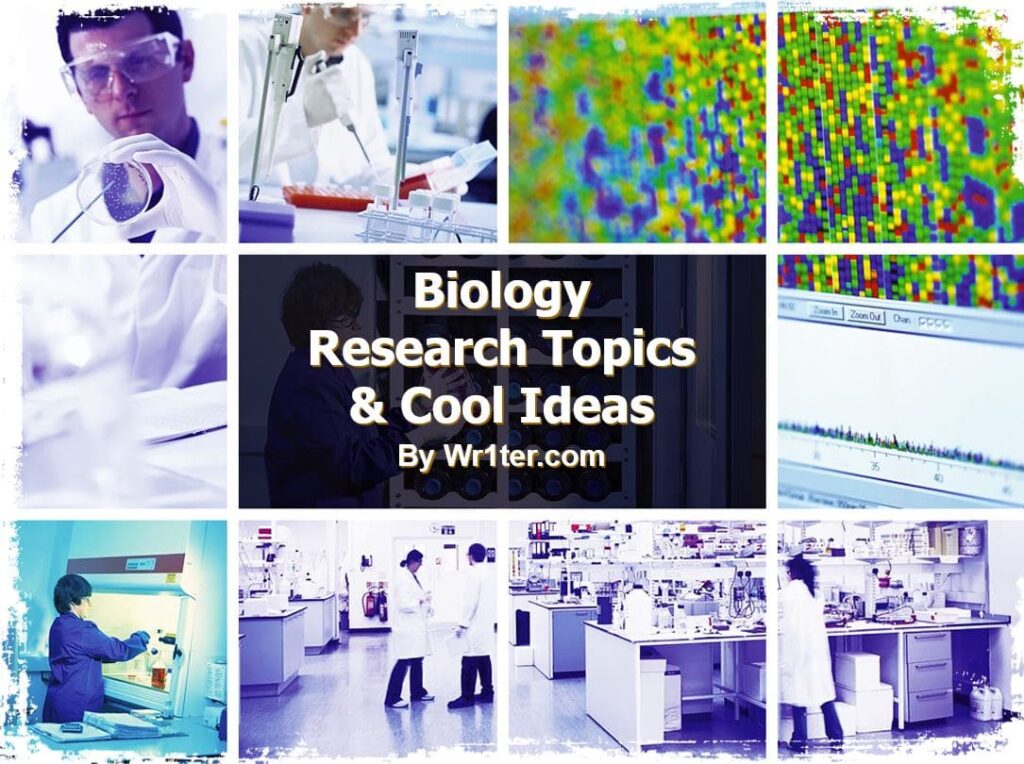
Easy Biology Research Topics
- Understanding Photosynthesis: The Green Magic
- Investigating the Life Cycle of a Butterfly
- Bird Migration Patterns and Causes
- Life in a Drop: Exploring Pond Microorganisms
- Exploring Darwin’s Theory of Natural Selection
- Mendel’s Laws: Studying Genetics in Pea Plants
- Food Chains and Energy Flow in Ecosystems
- Cell Structure: Uncovering the Building Blocks of Life
- Human Digestive System: From Bite to Nutrient
- How Does DNA Replication Work?
- Circulatory System: A Journey Through the Human Body
- Mushroom Lifecycle: An Investigation
- Tree Rings Tell a Story: Dendrochronology Basics
- Understanding the Human Eye: Vision Mechanics
- Adaptations: How Do Animals Survive in the Arctic?
- Coral Reefs: An Ecosystem Underwater
- Flower Pollination: The Work of Bees
- Why Do Leaves Change Color in Autumn?
- Mitosis: The Process of Cell Division
Interesting Biology Topics
- Symbiotic Relationships in Nature
- Mysteries of Bioluminescence
- Pandemics: Influenza and Beyond
- Neuroplasticity: Brain’s Adaptability
- Venomous Creatures and Their Defense Mechanisms
- Fermentation Process in Brewing
- Epigenetics: Beyond the DNA Sequence
- Journey Into the Human Genome
- Biodiversity in the Rainforest
- Life at the Extremes: Organisms in Deep Sea Vents
- Biomimicry: Nature’s Design Genius
- Invasive Species: Consequences and Control
- Plant Communication: More than Meets the Eye
- Stem Cells: Hope and Hype
- Human Microbiome: We Are Not Alone
- Camouflage and Mimicry in Nature
- Circadian Rhythms: The Body’s Internal Clock
- Probiotics: Beneficial Microorganisms
- Endangered Species: Conserving Biodiversity
- Cloning: Ethical and Biological Considerations
Biology Research Topics for High School
- Genetics and Inheritance Patterns
- Photosynthesis: Life’s Solar Panel
- Cell Division: Mitosis and Meiosis
- Human Immune System: Body’s Defense
- Ecology: Ecosystems and Food Webs
- Exploring the Animal Kingdom
- Plant Life: From Seed to Flower
- Bird Migration Patterns
- Endocrine System: Hormones at Work
- Aquatic Biomes: Life Underwater
- Genetic Engineering: Pros and Cons
- Taste and Smell: Sensory Biology
- Principles of Evolution
- Nutrition and Digestion
- Biotechnology and Its Applications
- Human Brain: Anatomy and Function
- Mitochondria: Powerhouse of the Cell
- Aquatic Pollution: Effects on Marine Life
- Disease Transmission: Viruses and Bacteria
- DNA and RNA: The Code of Life
Biology Research Topics for College Students
- Biological Effects of Climate Change
- Neurobiology of Sleep and Circadian Rhythms
- Behavioral Ecology: Studying Animal Behavior
- Nanotechnology in Biology
- Understanding Human Aging Process
- Stem Cells and Regenerative Medicine
- Exploration of Marine Biodiversity
- Ecological Impact of Invasive Species
- Cancer Biology: Mechanisms and Treatments
- Symbiosis in Nature: A Detailed Study
- Molecular Biology of Prions
- Biodiversity and Conservation
- Bioinformatics: Analyzing Biological Data
- Plant Genetic Engineering for Food Security
- Biochemistry of Metabolism
- Developmental Biology: From Zygote to Organism
- Neuroscience: Understanding the Human Brain
- Protein Structure and Function
Biology Research Topics for University
- Human Genomics: Decoding Our DNA
- Molecular Mechanisms of Diseases
- Microbiology of Extreme Environments
- Neuroplasticity and Learning
- Antibiotic Resistance: A Growing Threat
- Plant Responses to Environmental Stress
- Paleobiology: Reading Fossils for Evolutionary Patterns
- Nanomedicine: Opportunities and Challenges
- Advanced Immunology: Understanding Immune System
- Cellular Mechanisms of Aging
- Parasitology: Life Cycle and Host Interaction
- Bioengineering: Bridging Biology and Technology
- Comparative Anatomy: Insights Into Evolution
- Endocrinology: Hormones and Health
- Biology of Sex and Gender
- Bioluminescence in Marine Organisms
- Understanding Genetic Disorders
- Molecular Virology: Viruses and Host Interactions
- Genetics of Human Population Variation
- Microbial Ecology: Microbes in Ecosystems
Human Biology Research Topics
- Human Brain Mapping: Unraveling the Mysteries
- Genetic Basis of Human Diseases
- Stem Cells: Promise and Challenge in Medicine
- Epigenetic Modifications in Human Health and Disease
- Aging Process: Cellular and Molecular Mechanisms
- Biotechnology in Human Reproduction
- Neuroendocrinology: Interactions of Brain and Hormones
- Genomics and Personalized Medicine
- Environmental Influences on Human Health
- Challenges in Transplantation Biology
- Physiological Basis of Human Nutrition
- Molecular Basis of Human Cancer
- Immunotherapy: New Frontiers in Treatment
- Genetic and Environmental Factors in Obesity
- Deciphering the Human Microbiome
- Longevity and Lifespan Extension
- Circadian Rhythms in Human Biology
- Biological Markers in Neuropsychiatry
- Pathogenesis of Autoimmune Diseases
- Metabolic Syndrome: Interconnected Health Issues
Immune System Biology Topics to Research
- Deciphering the Role of Innate Immunity in Autoimmune Diseases
- Impact of Aging on Adaptive Immune Response
- Toll-Like Receptors and Their Contribution to Immune Defense
- Unveiling the Mystery of Immunological Memory
- Immuno-Oncology: Unraveling the Cancer-Immune System Battle
- Exploring the Complex World of Major Histocompatibility Complex (MHC)
- Intricate Interplay of Cytokines in Inflammatory Responses
- Harnessing Natural Killer Cells in Immunotherapy
- Role of Complement System in Immune Response and Disease
- Influence of Stress and Mental Health on Immune Functionality
- Antibody Diversity: Generation and Its Clinical Implications
- Immune Evasion Mechanisms Employed by Pathogens
- Unraveling the Biology of Regulatory T Cells
- Inflammatory Bowel Disease: An Immune System Conundrum
- Vaccines: Illuminating the Principles of Immune Activation
- Autoimmunity and Gender: Understanding the Female Predominance
- Dendritic Cells: Guardians of Immunity
- Role of Epigenetics in Immune Cell Differentiation
- Thymus and T Cell Maturation: An In-Depth Study
- Role of Nutrition in Modulating Immune Responses
- Unfolding the Link Between Allergies and the Immune System
Genetics Research Topics in Biology
- Genetic Algorithms: Explorations and Applications
- Epigenetics: Beyond the Human Genome
- Biodiversity and Genetic Conservation
- Gene Therapy: Ethical and Safety Concerns
- Molecular Mechanisms of Genetic Mutations
- Neurogenetics and Disorders of the Nervous System
- Pharmacogenomics: Personalizing Drug Therapy
- Transposable Elements in Genome Evolution
- Gene-Environment Interactions in Disease
- Genetics of Aging and Longevity
- Genome Editing Technologies and Implications
- Prenatal Genetic Screening and Diagnosis
- Human Behavioral Genetics: Nature vs. Nurture
- Cancer Genomics: Unlocking the Disease Code
- Forensic Genetics: DNA Evidence in Crime Solving
- Genetic Basis of Infectious Diseases
- Gene Regulation in Development and Disease
- Genetic Engineering: Prospects and Perils
- Population Genetics: Understanding Genetic Variation
- Genomics of Complex Traits and Diseases
Neurobiology Research Topics
- Molecular Mechanisms of Memory Formation
- Brain-Computer Interfaces: Bridging Neurology and Technology
- Neuroplasticity and Learning Adaptations
- Neuroimmunology: Immune Response in Neurological Disorders
- Neurobiology of Aging and Age-Related Disorders
- Neurochemical Correlates of Mental Disorders
- Decoding Neural Networks in Cognitive Function
- Genetic Influences on Neurodevelopmental Disorders
- Cellular Mechanisms of Sensory Perception
- Neurobiology of Pain: Unraveling Chronic Conditions
- Addiction Pathways in the Neurobiological Context
- Exploring the Biological Basis of Consciousness
- Neuroprosthetics and Their Clinical Implications
- Understanding Neurogenesis in Adult Brain
- Regenerative Medicine in Neurological Diseases
- Neural Circuitry and Emotion Regulation
- Neurobiology of Stress Effects on the Brain
- Neuroanatomy of Language and Communication Disorders
Evolutionary Biology Research Topics
- Speciation Mechanisms in Endemic Species
- Epigenetic Inheritance: A New Dimension in Evolution
- Adaptive Radiation in Island Ecosystems
- Sexual Selection and Animal Behavior
- Microbial Co-Evolution and Antibiotic Resistance
- Genomics and Phylogenetics: Tracing Life’s History
- Evolutionary Medicine: Disease and Natural Selection
- Allopatric Speciation in Geographically Isolated Populations
- Paleogenomics: Reconstructing Evolutionary History
- Ecological Genomics and Adaptive Evolution
- Evolutionary Bioinformatics: Decoding Life’s History
- Mimicry and Camouflage in Animal Kingdom
- Comparative Genomics in Evolutionary Studies
- Hominin Evolution: Tracing the Origins of Homo Sapiens
- Plant Evolution in Response to Environmental Stress
- Genetic Drift and Population Bottlenecks
- Evolutionary Ecology of Host-Parasite Interactions
- Molecular Phylogenetics and Species Divergence
- Selection Pressures in Pathogen Evolution
Research Topics in Biological Crossing
- Artificial Selection and Genetic Improvement
- Genetic Hybridization in Agriculture
- Transgenic Organisms: Methods and Implications
- Meiosis and Genetic Recombination
- Horizontal Gene Transfer in Bacteria
- Inbreeding Depression and Heterosis
- Cytoplasmic Inheritance in Plant Breeding
- Interactions of Crossing Over and Linkage
- Ethics and Biotechnology: GMOs in Focus
- Genome Editing Techniques: CRISPR and Beyond
- Selective Breeding and Animal Husbandry
- Interspecific Hybridization and Speciation
- Chromosomal Aberrations During Crossing
- Synthetic Biology: Creating Life in the Lab
- Next Generation Sequencing and Genomic Diversity
- Bioinformatics in Genomic Research
- Regulation of Meiotic Recombination in Eukaryotes
- Genetic Markers in Plant Breeding
- Chromosomal Mapping and Linkage Analysis
- Genome-Wide Association Studies in Complex Traits
Topics on Prohibited Research in Biology
- Ethical Dilemmas in Cloning
- Human Genetic Modification and Society
- Legalities Surrounding Stem Cell Research
- Chimeras: Genetic Engineering Boundaries
- Biohacking and Personal Genetic Engineering
- Euthanasia: Perspectives in Biological Sciences
- Dual Use Research of Concern (DURC) in Microbiology
- Creating Novel Pathogens: Scientific Gain or Risk?
- Human-Animal Embryo Research: Crossing the Line?
- Biopiracy and Exploitation of Indigenous Knowledge
- Brain-Computer Interfaces: Privacy and Consent Issues
- Eugenics and Genetic Discrimination
- Designer Babies: Possibilities and Ethical Challenges
- Artificial Wombs: Ethical and Legal Considerations
- Genetically Modified Crops: Ecological Concerns
- Animal Testing in Biomedical Research
- Age Reversal Experiments: Ethical Quandaries
- Synthetic Viruses and Biological Weapons
- Genetic Privacy in the Age of Personal Genomics
Topics on Experimental Research in Biology
- Pioneering Techniques in CRISPR-Cas9 Gene Editing
- Immunotherapy and Personalized Medicine Advances
- Experimental Designs for Microbiome Studies
- Single Cell RNA Sequencing Techniques and Applications
- In Vivo Models for Alzheimer’s Disease
- Investigating Symbiotic Relationships in Marine Biology
- Advancements in Bioluminescence Imaging Techniques
- Metabolic Pathways in Cancer: Experimental Approaches
- Investigating Brain Plasticity in Adult Mammals
- Strategies for Genome-Wide Association Studies
- Experimental Approaches to Studying Epigenetics
- Nano-Biotechnology: Novel Techniques and Applications
- Optogenetics in Neural Circuit Analysis
- In Vitro Fertilization: Advancements and Challenges
- Experimental Methods in Protein Folding Studies
- Techniques in Cellular Reprogramming
- Approaches in Tissue Engineering and Regenerative Medicine
- Neuroimaging Techniques in Cognitive Neuroscience
- Experimental Models for Studying Zoonotic Diseases
- Techniques and Challenges in 3D Bioprinting
Topics to Research on DNA
- Novel Insights Into DNA Repair Mechanisms
- Epigenetic Modifications in DNA Methylation
- DNA Barcoding and Biodiversity Studies
- Understanding DNA Replication Fidelity
- Whole Genome Sequencing: Techniques and Applications
- DNA Damage Response in Aging Cells
- Nanotechnology Approaches for DNA Sequencing
- Single Molecule Studies of DNA Replication
- Comparative Genomics and DNA Conservation
- Structural Studies of DNA-Protein Interactions
- Mechanisms of DNA Recombination
- CRISPR-Cas9 and DNA Editing Advances
- DNA Topology in Cellular Functions
- DNA-Based Therapies for Genetic Disorders
- Bioinformatics Tools for DNA Sequence Analysis
- DNA Fingerprinting in Forensic Science
- Origin and Evolution of Mitochondrial DNA
- Microsatellites and DNA Polymorphism
- Techniques in DNA Data Storage
- DNA Vaccines and Immunotherapies
Biology Topics to Research on Behavior and Hormones
- Behavioral Endocrinology: Hormones and Social Behavior
- Neuroendocrine Regulation of Aggression
- Circadian Rhythms and Hormonal Regulation
- Impact of Stress Hormones on Animal Behavior
- Hormones and the Development of Parental Behavior
- Adrenal Hormones and Fear Response Mechanisms
- Hormonal Influences on Human Sexual Behavior
- Behavioral Implications of Hormonal Imbalances
- Influence of Hormones on Eating Behavior
- Gonadal Hormones and Mood Disorders
- Endocrine Disruptors and Altered Behaviors
- Hormonal Control of Migration in Birds
- Hormones and Memory Formation: Neurobiological Perspectives
- Thyroid Hormones and Behavioral Development
- Pheromones and Reproductive Behaviors
- Serotonin, Dopamine, and Behavior
- Oxytocin’s Role in Social Bonding
- Growth Hormones and Aging Behavior
- Insulin and Behavior: Beyond Metabolic Regulation
Cell Biology Topics to Research
- Unraveling the Mysteries of Mitochondrial DNA
- Decoding the Language of Cell Signaling
- Cellular Mechanisms in Autophagy
- Exploring the Intricacies of Cell Death: Apoptosis vs. Necroptosis
- Understanding Mechanotransduction: How Cells Sense Mechanical Stress
- Navigating the Maze of the Cell Cycle: Checkpoints, Progression, and Control
- Molecular Choreography of Chromosome Segregation
- Epigenetic Modifications and Cellular Memory
- Unpacking the Secrets of the Nucleolus
- The Curious Life of Lysosomes: Beyond Waste Management
- Enigmatic Endoplasmic Reticulum: Functions and Pathways
- Cellular Journey: Endocytosis and Exocytosis Mechanisms
- Wnt Signaling Pathway: Critical Regulator of Cell Fate
- Deciphering the Role of Actin in Cell Motility
- Delving Into the World of Nuclear Pore Complexes
- Investigating the Role of Golgi Apparatus in Protein Trafficking
- Unfolding the Mystery of Protein Folding in Cells
- Dissecting the Details of the DNA Replication Process
- Uncovering the Dynamic World of Cytoskeleton
Molecular Biology Research Topics
- Decoding the Language of RNA Splicing
- Unraveling Introns and Exons: The Puzzle of Gene Expression
- Translation Process: Uncovering Ribosome Secrets
- Diving Into Telomeres: Maintaining Genomic Integrity
- Long Non-Coding RNAs: Genomic Dark Matter Illuminated
- Genome Organization: A Peek Into Chromatin Architecture
- Understanding DNA Methylation and Its Implications
- MicroRNAs: Small Molecules, Big Functions
- Transposable Elements: Jumping Genes and Genome Evolution
- Unveiling the Mystery of DNA Repair Mechanisms
- Revisiting the Central Dogma: From DNA to Protein
- RNA Interference: The Silence of Genes
- Mechanisms and Models of Genetic Recombination
- Unraveling the World of Quorum Sensing in Bacteria
- Understanding the Intricacies of Signal Transduction
- Post-Translational Modifications: The Final Touch in Protein Synthesis
- Decoding the Processes of Protein Degradation
- Nuclear-Cytoplasmic Transport: Moving Molecules Across the Cell
- Unpacking the Enigma of Prions: Infectious Proteins
Plant Pathology Research Topics
- Unraveling Plant-Virus Interactions: A Molecular Approach
- Plant Defense Mechanisms Against Pathogenic Bacteria
- Decoding Fungal Pathogenesis in Crops
- Molecular Insights Into Plant-Insect Interactions
- Nematodes and Plant Health: A Detailed Study
- Signaling Pathways Involved in Plant Immunity
- Phytoplasma-Plant Interactions: Understanding the Pathogenesis
- Biocontrol Agents in Combating Plant Diseases
- Mechanisms of Plant Resistance to Fungal Pathogens
- Exploring the World of Oomycetes: Plant Destroyers
- Host Specificity in Plant Pathogens: A Deep Dive
- Unraveling the Mystery of Mycotoxins in Plants
- Plant Proteases and Their Function in Disease Resistance
- RNA Silencing in Plants: Defense Against Viruses
- Plant Pathogenic Bacteria: Unveiling the Mode of Infection
- Phytoalexins: A Key Player in Plant Immunity
- Deciphering the Role of Plant Hormones in Disease Resistance
- Emerging Diseases in Crop Plants: A Global Overview
- Studying the Influence of Climate Change on Plant Diseases
Ecology Research Topics
- Understanding Species Interactions and Ecosystem Dynamics
- Climate Change and Biodiversity Loss: A Comparative Study
- Interplay Between Microbial Communities and Ecosystem Processes
- Invasive Species and Ecosystem Disruption: A Closer Look
- Sustainable Agricultural Practices and Their Effect on Ecosystem Health
- Examining Trophic Cascades in Aquatic and Terrestrial Ecosystems
- Biomonitoring and Its Significance in Conservation Biology
- Endangered Species Protection: Investigating Successful Strategies
- Biosphere Reserves and Their Contribution to Ecosystem Stability
- Fire Ecology: Unraveling the Effects of Wildfires on Ecosystems
- Marine Protected Areas and Their Significance in Ocean Health
- Exploring Ecosystem Services: From Pollination to Carbon Sequestration
- Landscape Ecology: Understanding Land Use Changes and Biodiversity
- Ecology of Urban Environments: Challenges and Solutions
- Ecological Succession: Understanding Changes in Ecosystem Over Time
- Fragmentation of Habitats: Causes, Effects, and Mitigation Strategies
- Pollution Ecology: Tracing the Effects of Contaminants on Ecosystems
- Ecology of Zoonotic Diseases: From Wildlife to Humans
- Alpine Ecosystems: A Study in Climate Sensitivity and Adaptation
Marine Biology Research Topics
- Exploring Deep-Sea Biodiversity and Its Conservation
- Conservation Strategies for Marine Protected Areas
- Understanding Coral Reef Dynamics and Resilience
- Ocean Acidification: Causes and Effects on Marine Life
- Cetacean Behavior and Communication Systems
- Unraveling Mysteries of Marine Bioluminescence
- Marine Biofouling: Understanding the Mechanisms and Finding Solutions
- Investigating Plastic Pollution in the Oceans: From Microplastics to Ghost Nets
- Jellyfish Blooms: Causes, Consequences, and Controls
- Assessing the Threats to Seagrass Meadows
- Understanding the Ecology of Hydrothermal Vents
- Shark Conservation: Challenges and Opportunities
- Effects of Sonar and Noise Pollution on Marine Mammals
- Marine Microplastics: Their Role in the Marine Food Web
- Invasive Marine Species: Mechanisms and Management
- Deep Sea Mining: Ecological Consequences and Mitigation
- Marine Parasites: Life Cycles, Host Interactions, and Ecology
- Exploring the Ecology of Mangrove Ecosystems
- Unraveling the Secrets of Marine Symbiotic Relationships
- Decoding the Language of Dolphin Communication
History of Biology Research Topics
- Understanding Linnaeus: His Contribution to Biological Classification
- From Alchemy to Biochemistry: Tracing the Historical Path
- Decoding the Double Helix: Discovery of DNA Structure
- Voyage of HMS Beagle: Darwin’s Journey and Its Implications
- Development of Modern Microscopy and Its Influence on Cell Theory
- Louis Pasteur and the Fight Against Infectious Diseases
- Fleming’s Accidental Discovery: The Advent of Antibiotics
- Mendel’s Peas: The Birth of Genetics
- In the Footsteps of Gregor Mendel: The Expansion of Genetic Studies
- Exploring the Origins of Molecular Biology
- History of Biotechnology: From Yeast Fermentation to Genetic Engineering
- Dolly the Sheep: A Historical Perspective on Cloning
- Biological Warfare: An Analysis From Ancient Times to Modern Day
- From Eugenics to Modern Genetics: A Controversial History
- Endosymbiotic Theory: Tracing the Origins of Mitochondria and Chloroplasts
- Nobel Prizes in Biology: Insights Into Scientific Progress
- Understanding the History of Genetic Engineering
- Vaccination: A Historical Perspective From Smallpox to Covid-19
- Unraveling the Human Genome Project: A Historical Approach
- Rosalind Franklin and the Unseen Contributions of Women in Biology
Animals Biology Research Topics
- Comparative Analysis of Neural Networks in Echolocating Bats and Dolphins
- Potential Applications of Biofluorescence in Marine Organisms
- Genomic Adaptations in High Altitude Birds: A Deep Dive
- Microbiome Influence on Mammalian Health and Behavior
- Biodiversity Conservation Strategies in Tropical Rainforests
- Understanding Bioluminescence: From Fireflies to Deep Sea Creatures
- Climate Change Effects on Polar Bear Migration Patterns
- Metabolic Flexibility in Hibernating Mammals
- Intricate Courtship Behaviors of Birds of Paradise
- Survival Strategies of Desert Dwelling Species
- Behavioral Plasticity in Social Insects
- Species Survival in the Midst of Habitat Fragmentation
- Exploring Symbiosis: Coral Reefs and Their Resident Microorganisms
- Adaptation Mechanisms of Alpine Flora and Fauna
- Communication Strategies among Cephalopods
- Antarctic Krill: A Keystone Species in a Changing Environment
- Tracking Migration: Navigational Abilities of Monarch Butterflies
- Investigating Tool Use in Cetaceans
- Molecular Mechanisms Behind Poison Production in Venomous Creatures
Zoology Research Topics
- Animal Camouflage: Unraveling the Mechanisms Behind Crypsis
- Conservation Strategies for Endangered Amphibian Populations
- Dynamics of Social Hierarchies in Primate Groups
- Mechanisms of Venom Production in Conus Snails
- Assessing Biodiversity in Deep Sea Ecosystems
- Nutrient Cycling in Detritivore Communities
- Signal Transduction in Echolocating Mammals
- Flight Adaptations in Migratory Bird Species
- Uncovering the Secrets of Bioluminescence in Cnidarians
- Hibernation Patterns in Arctic Mammals
- Endocrine Disruption in Aquatic Invertebrates
- Territorial Behavior among Canine Species
- Parasite-Host Interactions in Marine Ecosystems
- Predator-Prey Dynamics in Savannah Ecosystems
- Investigating Cooperative Behavior in Social Insects
- Adaptations of High-Altitude Wildlife to Hypoxia
- Understanding Reproductive Strategies in Coral Reefs
- Deciphering Communication Systems in Cetaceans
- Conservation Challenges for Island Endemics
- Complexities of Mating Systems in Arachnids
Botany Research Topics
- Plant Defenses Against Herbivory: Chemical Warfare in the Plant Kingdom
- Molecular Mechanisms of Drought Resistance in Succulents
- Circadian Rhythms in Photosynthesis: A Closer Look
- Biotechnological Approaches to Improve Crop Yield
- Signals and Responses: Understanding Plant Hormones
- Mycorrhizal Networks: Unseen Interactions in the Plant World
- Genetic Biodiversity in Ancient Tree Species
- Plant-Pollinator Relationships in Tropical Rainforests
- Ecophysiology of Desert Flora: Surviving Extreme Conditions
- Harnessing the Power of Algae: Biofuel Potential and Challenges
- Investigating Disease Resistance in Commercially Important Crops
- Exploring Chemical Communication in Plant Communities
- Strategies for Invasive Plant Species Management
- Understanding the Molecular Basis of Phototropism
- Cyanobacteria and Nutrient Cycling in Aquatic Ecosystems
- Unraveling the Genetic Basis of Plant Longevity
- Biotic and Abiotic Stress Responses in Forest Trees
- Applications of Plant Tissue Culture in Agriculture
- Alpine Plant Adaptations: Surviving at High Altitudes
Developmental Biology Research Topics
- Organogenesis: Tracing the Formation of Complex Structures in Mammals
- Decoding the Mysteries of Axolotl Regeneration
- Mechanisms of Early Embryonic Patterning in Drosophila
- Epigenetic Regulation in Mammalian Neural Development
- Investigating the Molecular Basis of Morphogenesis in Zebrafish
- Neural Crest Cells: Pioneers in Vertebrate Development
- Embryonic Development and Metamorphosis in Amphibians
- Cell Fate Determination During Gastrulation
- Signaling Pathways Involved in Limb Development
- MicroRNAs in the Control of Cell Differentiation
- Sex Determination Mechanisms in Reptiles
- Axonal Guidance: Exploring Molecular Mechanisms
- Intricate Choreography of Cell Movements in Gastrulation
- Epigenetic Influence on Stem Cell Potency
- Somitogenesis: Segmentation in Early Vertebrate Development
- Imprinted Genes in Mammalian Development
- Unraveling the Mechanisms of Asymmetric Cell Division
- Molecular Regulation of Cardiac Development
- Genetic Control of Eye Development in Drosophila
- Exploring the Basis of Cellular Plasticity During Development
Environmental Biology Research Topics
- Assessing Biodiversity in Freshwater Ecosystems: Challenges and Approaches
- Climate Change and Species Distribution: Anticipating Shifts
- Understanding the Persistence of Keystone Species in Urban Environments
- Effects of Ocean Acidification on Marine Life
- Soil Microbiome Composition and Its Influence on Plant Health
- Plastic Pollution in Marine Ecosystems: Assessing the Scale
- Phytoplankton Productivity in Response to Changing Sea Surface Temperatures
- Mechanisms of Survival in Extreme Environments: Studying Extremophiles
- Forest Fires and Ecosystem Recovery: A Holistic View
- Air Pollution Effects on Lichen Diversity and Distribution
- Ecological Consequences of Invasive Species: Case Studies
- Bioindicators in Monitoring Environmental Health: A Comprehensive Analysis
- Conservation Priorities in Biodiversity Hotspots
- Ecotoxicology: Assessing the Effects of Pollutants on Wildlife
- Dynamics of Algal Blooms in Response to Nutrient Loading
- Adaptation Strategies of Arctic Wildlife to Climate Change
- Tracking the Movement of Pollutants in Aquatic Food Webs
- Endocrine Disruptors in the Environment: Sources and Effects
- Mangrove Ecosystems in the Face of Sea-Level Rise
Abortion Biology Research Topics
- Deciphering Molecular Mechanisms Underlying Spontaneous Abortion
- Influence of Maternal Stress Hormones on Early Pregnancy Outcomes
- Understanding the Etiology of Recurrent Miscarriage
- Immunological Aspects of Pregnancy and Abortion: An Interplay
- Investigating Genetic Abnormalities in Cases of Spontaneous Abortion
- Endocrine Disruptors and Pregnancy Outcomes: A Complex Relationship
- Nutritional Factors Affecting Pregnancy Viability
- Pathophysiology of Ectopic Pregnancy
- Correlation Between Age and Miscarriage: Unraveling the Underlying Causes
- Exploring the Intersection of Infections and Pregnancy Outcomes
- Autoimmune Disorders and Their Influence on Pregnancy Termination
- Epigenetic Modifications and Pregnancy Loss: An Uncharted Territory
- Embryo Implantation Failure: Causes and Potential Interventions
- Investigating the Role of Antiphospholipid Syndrome in Miscarriage
- Assessing the Influence of Environmental Toxins on Pregnancy Outcomes
- Cellular Mechanisms of Embryo Rejection
- Physiological Responses to Termination of Pregnancy
- Effects of Chronic Diseases on Pregnancy Outcomes
- Understanding Fetal Development in High-Risk Pregnancies
- Pathological Examination of Miscarriage: Advancements and Challenges
Recent Research Topics in Biotechnology
- Precision Genome Editing: CRISPR and Beyond
- Harnessing the Power of Microbial Factories for Biofuel Production
- Exploring Cellular Agriculture: Lab-Grown Meat and Its Implications
- Unraveling the Potential of Stem Cells in Regenerative Medicine
- Advancements in Plant Genomics for Sustainable Agriculture
- Nanotechnology in Drug Delivery Systems: Current Developments
- Protein Engineering for Biotherapeutic Applications
- Bioinformatics in Personalized Medicine: Opportunities and Challenges
- Decoding the Microbiome: Health, Disease, and Biotechnological Applications
- Synthetic Biology: Designing Biological Systems for Industrial Applications
- Neuroengineering: Interfacing Electronics with the Brain
- Biotechnology in Waste Management: Toward a Circular Economy
- Gene Therapy Approaches to Rare Genetic Disorders
- Biomaterials in Tissue Engineering: Opportunities and Challenges
- Development of Biodegradable Plastics Through Microbial Fermentation
- Biosensors for Environmental Monitoring: Emerging Techniques
- Biotechnological Strategies for Antimicrobial Resistance
- Microbial Biofilms in Industrial Processes: Pros and Cons
- CRISPR as a Diagnostic Tool: Current Progress
- Application of Biotechnology in Forensic Science: New Frontiers
To Learn More, Read Relevant Articles

138 Global Warming Essay Topics & Ideas
- Icon Calendar 11 June 2023
- Icon Page 1440 words

207 Climate Change Essay Topics & Ideas
- Icon Calendar 10 June 2023
- Icon Page 2063 words
- Skip to primary navigation
- Skip to main content
- Skip to footer
Biology Wise
50 Really Good Topics for Research in the Field of Biology
Biological research has advanced in leaps and bounds, in the past few decades. With the completion of the Human Genome project in April 2003, new tools and techniques have been developed, and are being utilized to study various aspects of biology.
Like it? Share it!

Never-ending recitation
If one were to continuously read aloud the letter of each base of the 3 billion bases that make up the human genome, without taking any breaks at all, the recitation would last for a period of 57 years!
The advancement in research has granted humans an understanding of how living organisms function and the purpose of their function: how they interact with the environment, the type of inter-species interactions that they have, and the impact such interactions have on the rest of the planet. These explanations have given rise to further questions based on the origin and evolution of all biological species, which eventually leads to queries regarding the exact processes occurring within an organism that determine all aspects of its existence, including the impact it has on its environment.
At present, the rising progress in science, medicine, and technology has made positive as well as negative impacts on the planet, as a whole. Current scientific research hopes to resolve these negative impacts with biological solutions, while at the same time demystifying and resolving queries related to the biota.

Aging or senescence is the collective process through which an organism undergoes multiple physiological changes over the course of its lifetime. It includes the development of an organism’s cognitive functions till it reaches maturity, and then a steady decline of those same functions till the organism’s eventual death. Such a decline affects other body processes, leading to their impaired functioning.
In humans, aging brings with it, body frailty, organ weakness, and mental decline. Research has shown that humans are born with a biological clock that regulates this process of aging. This clock functions by the combination of a steady loss of hexamer telomeric repeat sequences of chromosomes during replicative processes and the accumulation of DNA damage and cellular wastes in an organism during the course of its life.
Scientists have researched model organisms such as C. Elegans, and observed reduced senescence in the event of selective mutations in specific genes. However the same result is yet to be reproduced in higher and more complex organisms, hence the elucidation of the exact process remains a mystery. As more studies are carried out, more theories are put forth to help explain the occurrence of this process, along with ways to prevent and reverse it.
Relevant Research Topics
- Selective telomerase activation to delay senescence
- Inhibition of mTOR gene and gene products for longevity of life
- Effects of diet (caloric restriction) on lifespan
- Effect of altered energy generation capacity (epigenetic changes) on the process of aging
- Effect of reduced mRNA translation on senescence
Agriculture

The ever-growing human population along with the recent population explosion has caused a dramatic increase in the demand for food crops. This coupled with the occurrence of natural disasters like earthquakes, floods, etc., and pest problems, result in huge losses of food grains. Such a shortage increases the world’s hunger problem, where most of the inhabiting people of developing nations are unable to feed themselves everyday.
To solve such a mammoth crisis, and to avert death of people on account of starvation, the yield of food has to be increased manifold. One way to do this, can be by upgrading the agricultural practices of farmers; by giving them advanced know-how, better tools and implements, and to have precautions in place to protect the farmed yield from instances of natural disasters and pest populations.
Another way to overcome this problem, is to research and produce newer varieties of these food crops that are resistant and even repellent towards pest populations, while at the same time produce a very high yield with minimum care. Varieties of crops which produce food in more than one season, can also be produced.
- Development of GMO food crops
- Development of high-yield varieties of wheat and corn
- Imparting viral, fungal, and bacterial resistance to crop plants,
- Study of salt and water stress on plants
- Inducing production of pest-repellent natural biochemicals (e.g. nimbidin from neem tree) in normal food crops
Antibiotic Resistance

With the advent of vaccines, anti-microbial, and anti-viral agents, numerous diseases have been eradicated, averted and contained. Infections that would have proven fatal a few decades ago are now taken care of by a mere injection, tablet, or a capsule, helping in increasing the overall health of the human population.
But with the excessive use of antimicrobial solutions, nature serves us a reminder of continuous evolution in the form of antibiotic resistant strains of micro-organisms. As the strength and efficiency of these antibiotics evolves due to medical research, the infectious organisms too evolve and adapt to overcome these substances. An infection caused by such an organism is not only untreatable, but also proves to be fatal.
To curb this evolution of “super-bugs”, newer mechanisms and pathways have to be researched to prevent infections by these organisms. Also, targeted drugs have to be developed that halt the organism’s internal processes, thereby rendering it unable to infect.
- Mechanism of pathogenesis of antibiotic resistant agent
- Drug designing of molecules that hamper pathogenicity
- Development of a biomolecule that induces programmed cell death by caspase activation in resistant organism
- Development of new target models to produce more effective antibiotics
- Studying effects of probiotics in infection prevention
Bioremediation
Technology has brought the world closer and improved the quality of life considerably. Actions that took extended periods of time, can now be carried out easily and within a short time. There is year round availability of goods in all parts of the world.
But such industrial advancement comes with its fair share of adverse consequences. The petroleum industry which provides fuel for so many purposes, has accidents which cause oil spills in oceans. These affect the natural fauna and flora of the marine ecosystem. The smoke emissions from vehicles and industries cause air pollution, which in turn affects the health of animals and humans equally. The effluents from the factories pollute water bodies, that eventually affect anything and anyone that utilizes the water.
These instances are not only hampering the health of organisms but also affecting the physical world in the form of climate change, global warming, and ozone depletion. Scientists are now working on natural biological ways to rid the environment of such harmful pollutions, and are also devising ways in which the pollution is altered and reduced at their very source.
- Development of GMO microbes that break down oil
- Development of eco-friendly fuel alternatives (bio-diesel)
- Practical use of bioluminescence in place of electricity
- Bio-films that absorb air pollution
- Studying plants (water hyacinth) and microbes that can absorb heavy and toxic elements from effluents of industries
Cancer Metastasis

Cancer is one of the major health concerns in humans. It is the condition of uncontrolled and abnormal division of body cells. These cells have the potential to spread to other parts of the body, and spread the cancer. Cancer is characterized by the formation of a cell mass called the tumor. There are two types of tumors – benign and metastatic. The benign tumor is just a compact overgrowth of cells that can be easily removed by surgery. However, if the cells turn metastatic, that is they gain the ability to migrate to other parts of the body via the blood stream, the tumor is said to be malignant.
Maximum cases of death due to cancer are due to recurrences of the tumor. Tumors once removed, recur due to the metastatic nature of the cells. If the metastasis is prevented or averted, the chances of the tumor recurring are drastically reduced.
Not only is this condition without a cure, but the mechanisms by which it occurs is also not known in detail. Research has to be carried out to determine the mechanism by which it occurs, and only then could a way be worked out to prevent and eventually cure this condition.
- Studying mechanism of cancer metastasis
- Rescuing function of tumor suppressor genes in cancerous state
- Developing methods and tools to identify and eliminate cancer cells without hampering healthy cells
- Targeted drug therapy to cancer sites
- Gene therapy to hamper the cancerous cell’s metastatic pathway
Developmental Biology

All organisms develop from a single-celled zygote, and animals within the same order and family of classification resemble each other during the initial stages of embryonic development. The field of developmental biology deals with the study of how complex multicellular organisms develop and emerge from what is essentially a ball-like mass of cells (morula).
It consists of studying the various processes that give rise to our characteristic physical appearance, body plan and structures, and the regulatory processes of the body. Any defect or malfunction during the embryogenesis process causes a structural and functional defect in the individual organism. In some cases the defect is too large to overcome, and proves fatal to the organism, leading to the death of that developing embryo.
Developmental defects cause a variety of health disorders such as spina bifida, microcephaly, schistocystis, etc. Researching the causes of these conditions may offer an insight into their management and possible cure.
- Epigenetic basis of embryogenic development
- Specific cell fate and cell mapping of gastrula cells in development of higher animal fetuses
- Genetic basis of cleft palate
- Gestational environment that leads to developmental defects
- Effect of maternal health and diet on developing embryo
Genetic Disorders

Genetic research has opened up a new approach towards the cause of multiple disorders. A majority of birth defects, syndromes, and disorders are due to gene defects. This understanding has allowed researchers to investigate the genetic basis of diseases and disorders.
Any disorder that occurs, is mainly due to a mutation or defect in the gene sequence. This disruption causes a change in the protein encoded by that gene. The altered protein leads to a malfunction or prevents the occurrence of a process eventually, thereby giving rise to the disorder.
A few such disorders include Downs syndrome, Huntington’s disease, Marfan syndrome, Alzheimer’s, Lesch-Nyhan syndrome, and Cystic Fibrosis. Studying the mechanisms of these diseases will help elucidate the path along which the disease progresses, and the role of the genes involved.
- Cystic fibrosis (CFTR gene)
- Huntington’s disease (HTT gene)
- Lesch-Nyhan syndrome (HPRT1 gene)
- Wilson’s disease (ATP7B gene)
- Down syndrome (trisomy of 21st chromosome)
Infertility

The sedentary lifestyle of people, coupled with the pollution in the environment, and stress, are causes of a number of health concerns, one of the major concerns being infertility. More and more people are unable to procreate, and have been diagnosed to be infertile. While adoption is a viable option, the people diagnosed with infertility still prefer having a child of their own. A major reason behind this logic being the social stigma attached to the concepts of infertility and adoption.
Infertility, to a certain extent, can be reversed by a change in the lifestyle of the affected individual. But in some cases, the reason might be structural or genetic. The karyotyping or a body exam of the individual may yield the reason behind the infertility or the reason may be genetic.
- Effect of Robertsonian translocations on infertility
- Effect of Ring chromosomes on infertility and miscarriages
- Age-related factors affecting infertility
- Development of refined In Vitro Fertilization (IVF) and Post Implantation Genetic Diagnosis (PIGD) techniques
- Hormonal basis of miscarriages
Neurobiology

The most mysterious and elusive of organs, the brain, is the most vital organ of the body. It not only controls all the processes of the body, but also the thoughts, instincts, and actions of the individual. It is responsible for the personality and the behavior of every individual. Despite this, the brain is yet to be fully mapped out and elucidated.
Within the gyri and sulci of the brain, neurons pass electrochemical impulses that allow the brain to comprehend and react to the surroundings. While the basic functions of neurons are studied and known, still mystifying are the concepts of intelligence, memory, perception, psychology, behavior, and thoughts. Also, the concept of soul and whether it exists or not, remains unresolved.
- Comprehensive brain mapping
- Brain activity during epileptic seizures
- Basis for substance addiction
- Brain processes involved in memory, intelligence, and formation of thoughts
- Twin studies of monozygotic twins developing different personalities and behavior traits
Structural Biology

The field of structural biology is studied to determine the 3d structures of biological macromolecules, how they interact with other molecules, and how alterations in their sequences lead to structural changes. It is studied by making use of a number of software tools that are programmed to predict various structural aspects based on the protein sequence provided to it.
The protein sequence is provided by means of in vitro lab assays specifically designed for that purpose. The software predictions are based on the results of techniques such as mass spectroscopy, X-ray diffraction, nuclear magnetic resonance, etc,. Research in this field can be used to know how mutations affect the 3d structure of the molecule it codes for. It can also be used to study the interactions between proteins, or between ligand and receptor molecules.
- In silico study of biological macromolecules
- Prediction of protein structure based on altered sequence
- Protein-protein interaction related to immune response
- In silico drug designing against virulent protein
- Studying protein structure and interactions in case of an unknown pathogen
Research on any of these topics will revolutionize the understanding of biological processes, and help humans in improving their quality of life without having an adverse effect on the environment. A number of universities and research foundations are dedicated towards finding the answers to the issues mentioned here.

Get Updates Right to Your Inbox
Privacy overview.
- Skip to primary navigation
- Skip to main content
- Skip to footer
- SCIENCE COMMUNICATION LAB
- IBIOLOGY LECTURES
- IBIOLOGY COURSES
Bringing the World's Best Biology to You
iBiology Research Talks by Topic
At the heart of iBiology are over 600 talks from the world’s leading scientists, sharing their research, their experiences, and the joys of discovery.
- Biochemistry

Optimizing Biofuels

Lipid Droplets

Mitochondria, Metabolism, and Cell Behavior

Regulation of Cholesterol Synthesis
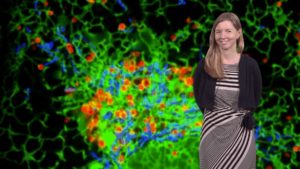
Endoplasmic Reticulum Membrane Contact Sites

Introduction to Ion Channels
- Bioengineering

Good Chemistry

Tinkering with Nature’s Tools

Synthetic Cells

- Genome Engineering with CRISPR-Cas9

Liquid Phase Separation in Living Cells

Realizing Synthetic Carbon Dioxide Fixation

Using math to define life
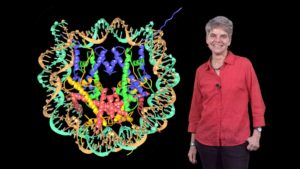
Discovery of the Structure of the Nucleosome

How Flies Fly

Discovery of Lung Surfactant

Single-Cell Imaging: Reconstructing Mouse Development

RNA Localization: Following Single mRNAs in Living Cells
- Cell Biology

Chromosomes in inviable hybrids

Skin Fat Regulation

BRUCE protein and liver disease

Meselson Stahl Experiment

Macromolecular Cryocrystallography

X10 Expansion Microscopy
Development and stem cells.

Injury Response in Intestinal Villi

Reprogramming in the Inner Ear

Root Development
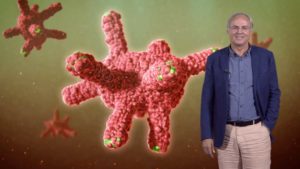
Adult Stem Cells and Organoids

Outer Subventricular Zone Radial Glia Cells

X Chromosome Inactivation

Fire Among Giants

Soil Microbes and Plant Defenses
Corals: on the brink.

A Walk in the Woods

Bat Vision Evolution

Restoration Ecology in Coastal Wetland

The Century of Biology

Temperature, parasites, and public health

Educational science videos: Paper discussion and Q&A

The Making of a Parasitic Plant

Archaea and the Tree of Life

Do Female Frogs Call?
Genetics and gene regulation.

Homology-directed repair

Modeling Chromatin Interactions

2022 Share Your Research series trailer

Finding Faith in Science

Transcriptional Adaptation to Mutations

Understanding Meningioma Biology
- Human Disease

Drink up to improve brain health

Tumors and the Immune System

Decoding Brain Tumors with Extracellular Vesicles

Microglia in Health and Disease

Arbovirus Transmission

Rett Syndrome and the Insight it Provides into Syndromic Autism

Gene Changes With Social Interaction

Pieces of a Puzzle

Malaria and Malaria Parasites

Tick and Other Arthropod Saliva

- Cells of the Immune System

A Mouse Model to Understand Lupus
- Microbiology

Decoding Ancestral Knowledge

Electric Microbes

How to Kill a Superbug

The CRISPR Apostle

Maternal Stress Impacts Infant Immunity

A newly discovered antibiotic
- Neuroscience

A Winding Life Through Science

Individual Recognition in Zebra Finch

Viral Resistance of Squash

Maternal Literacy and Brain Development

Anesthesia and the Brain

Using Storytelling to Share Memories Across Brains
- Plant Biology

Modeling a Soil Microbiome

The Future of Forests

Gregor Mendel's Famous Genetics Experiment

The Cell Wall

How Corn Fights Crop Stress

Plant-Pathogen Interactions

Single Cell Sequencing

Systematic Approaches for Mapping the Cell
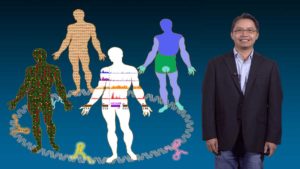
Epigenomics and LncRNAs

- Bioimage Analysis

The Scientific Community Image Forum

CellProfiler

RedCiencia - network for Spanish-speaking scientists

Building RedCiencia

Harmony: Science and Song

The Practice of Mentoring Scientists

Teach Science: Giving Back

The Michigan Initiative

iBiology and iBiology Courses are part of the Science Communication Lab (SCL). Our mission remains the same, to connect people to science. However, our focus has shifted to producing and evaluating cinematic films for education and the public, which you can find on the Science Communication Lab website. Please visit us there for new content and videos!
Find a Video
- Search Videos
- All Playlists
- All Speakers
- YouTube Channel
- Other Languages
- CRISPR-Cas Technology
- Development & Stem Cells
- Genetics & Gene Regulation
- Science and Society
For Educators
- New! SCL Films for Education
- New! SCL Educator Newsletter
- iBiology Educator Resources
- iBiology Flipped Courses
- iBiology Courses Resources
- Recommended Playlists
- View All Educator Resources
Educators Recommend
- Discovering Cell Cycle Regulators
- Hardy-Weinberg Equilibrium
- Next Generation Sequencing
- Semi-Conservative Replication of DNA
- Toll-Like Receptors in Adaptive Immunity
- Learn Microscopy
- Intro to Microscopy
- Intro to Flow Cytometry
- View All Techniques
Free Courses
- Free Online Courses
- Launch iBiology Courses
- Cell Biology Flipped Course
- Engineering Life Flipped Course
- Evolution Flipped Course
- Immunology Flipped Course
Career Development
- Career Development Courses
- Career Development Videos
- Career Exploration Videos
- Biomedical Resources
- Biomedical Workforce
- View All Career Development
Our Favorites
- Short Films & Stories
- Feature Documentaries
- Famous Discoveries
- Improving Diversity in Science
- Share Your Research Series
Connect with Us
- iBiology’s Mission
- Contact iBiology
- Video Usage & Licensing
- Sign Up for Our Newsletter
- Subscribe to YouTube Channel
- Go to the Science Communication Lab

List of 225 Different Biology Research Topics
Finding research topics in biology and other interesting biology topics to research can be difficult at times, and if you’ve ever asked “what are some good biology research topics”, then this article is for you. Here are 225 different biology research topics and topics related to biology.

Biology Topics to Research
Here are new biology research paper topics and biology research proposal ideas that can be chosen as research topics for biology majors. If you’re looking for good biology topics for research paper, then look no further. With this list, you never have to ask again, “what are some biology topics to write about?”
- Prevalence of antibiotic resistance
- Bone marrow transplants in sickle cell treatment
- Superiority of asexual reproduction over sexual reproduction
- Bioremediation
- DNA evolution
- Antibiotic resistance as a blessing
- Splicing in treating congenital deformities
- Superiority of sexual reproduction over asexual reproduction
- Importance of a stable sleep cycle
- Effects of music on neurodivergence
- Animal regeneration
- Adaptation in birds
- Role of T-cells in cancer
- How the brain recycles information
- Negative effects of probiotics
- Effects of potassium ash on plants
- Transport systems in brain cells
- Effectiveness of transport proteins
- Flaws of transport proteins
- Human auto-immune diseases
- Genetic mapping of the Benjamin Button disease
- Evolution of parasites
- Symbiosis between fungi and trees
- Transport system in plants
- Effects of plant hormones on humans
- The superiority of GMO over natural microorganisms
- Antibiotic resistance in animals
- Organisation in hormones
- Allergens in vaccines
- Innate immunity versus acquired immunity
- Complications from grafting
- The adaptation of memory cells
- Treatment of osteoporosis
- The genetics behind down syndrome
- Signal transport throughout the CNS
- Formation of neurones
- How human behaviour affects animals around them
- How human behaviour affects plants around them
- Drug resistance as a form of evolution
- Evolution of DNA technology in treating human diseases
- Evolution of DNA technology in treating animal diseases
- Application of DNA editing in treating congenital malfunctions
- The science of neurobiology
- Effectiveness of the paleo diet
- Complications of human cloning
- Cloning in animals versus plants
- Ethical questions in human cloning
- Usefulness of rodents in medicine
- The effectiveness of keto diets
- Adverse effects of sunscreen
- Effects of ultraviolet rays on plants
- Effects of electricity on the brain
- Use of vibrations in regulating blood flow
- Effects of noise pollution on foetal development
- Effects of noise pollution on the brain
- Hormonal causes of osteoporosis
- Potassium and calcium in managing osteoporosis
- The efficiency of anti-retroviral drugs
- Rhesus factor in foetal development
- Using the DNA as a storage device
- Effective storage methods for DNA
- The use of DNA in creating personalised products
- Genetic evolution in increasing longevity
- The use of genetics in creating personalised food
- Ethical concerns involving GMOs
- The use of genetics in forensic science
- Ethical concerns over DNA-personalised products
- Nanomaterials in the food industry
- Nanomaterials in the cosmetic industry
- Harmful effects of toothpaste
- Hypersensitivity in animals
- Effects of acid rain on vegetation
- The benefits of biodegradable materials
- Reaction of plants to trace elements
- Nanotechnology in surgery
- Effects of serotonin on the brain
- Medical advancement in weight management
- The placebo effect
- Effects of lead poisoning
- Calcicosis in young children
- Effectiveness of homeopathy in treating illnesses
- Reasons for calcification in the body
- Psychological effects of dopamine
- Impact of radio waves on foetal development
- Immortality in jellyfishes
- Problems of plant grafting
- How genetics affects obesity
- Hormones as transporters
Biology Related Research Topics
Aside from biology research proposal ideas, there are several other new biology related research topics. These topics guarantee great grades, and here are some examples.
- The use of hypnosis in medicines
- Relationships between birth control pills and depression
- The ecology of marine biology
- The occurrence of male pregnancy
- Overgrazing in aquatic environments
- Advancements in plant extraction technology
- Growth enhancement in plants
- Growing plants without soil
- The use of fungi in accelerating plant growth
- Causes of stress in plants
- The link between diet and sustainability
- How geography affects fertility
- Food poisoning from roadside foods
- History of Gram staining
- Light microscope versus electron microscope
- Etymology of the Ebola virus
- Fundamental cloning principles
- Congenital defects that are hereditary
- Auto-immune diseases in animals
- Hypersensitivity in plants
- The use of melatonin in medicine
- Mankind’s dependence on rainforests
- Overdependence on synthetic products
- How microorganisms influence depression
- Gut microorganisms and eating disorders
- Gene therapy in modern times
- The body’s natural defence against cancer cells
- Contributions of gene therapy in medicine
- Relationship between infections and probiotics
- Mental retardation in animals
- Mitigating potential weaponisation of hazardous pathogens
- Does the brain really “delete” information?
- The REM sleep stage
- False memories
- How the psyche affects physical health
- Stress and wellness
- Neural mapping
- Psychosocial development of infants
- Do genes predispose aggression?
- Genotype prediction: fact or hoax?
- How empathy can help patients heal faster
- Relationships between PCOS and diabetes
- Causative factors of PCOS
- Genetics and polycystic nephritis
- Treatment of polycystic nephritis
- Is PCOS a disorder of the brain?
- Brain fog: causes, prevention and treatment
- Insulin in PCOS treatment
- How PCOS affects CSF and brain matter
- Pathology of neurodegenerative diseases
- PTSD in children
- Dangers of Pavlovian conditioning
- Management of polycystic nephritis
- Downsides of immunotherapy
- How insomnia affects the immune system
- How hypersomnia affects the immune system
- How antibiotics affect cells
- The science behind food intolerance
- Effects of electricity on plants
- Plant adaptability
- Animal adaptability
- Homosexuality in animals
- Effects of hormones on human behaviour
- The science behind bipolar disorder
- In vitro growing of organs
- Problems of DNA testing
- Genetic differences in identical twins
- Transgenic crops: pros and cons
- How sterile environments affect the immune system
- Immune system malfunctions
- Shortfalls of animal DNA modification
- Shortfalls of human DNA modification
- Influences of DNA on aging process
- How climate affects biodiversity
- Unethical uses of animals in medicine
- Hormone-influenced psychopathy
- Communication in plants
- Plant sensory receptors
- Plant-insect interactions
- How technology protects biodiversity
- Impact of modernisation on nature
- Regeneration in infant brain cells
- Nature conservation policies
- Mutation in plasmids
- Adaptation in microbiology
- Predicting protein structure
- Effects of overpopulation
- Problems in environmental protection
- Enzyme behaviour
- Similarities between biochemical and chemical reactions
- The structure of proteins
- Effects of stress on immunity
- Autoimmunity
- Graft rejection
- Modern technology and plant development
- Hormonal therapy
- How exercise affects hormones
- Causes of mutation
- Grafting in animals
- Communication in animals
- Organic farming
- Effects of oil spills
- Animal resistance mechanisms
- Plant resistance mechanisms
- Microbial resistance mechanisms
- Theory of natural selection
- Immortality in plants
- Immortality in animals
- The science behind hypnosis
- Marijuana in medicine
- Effects of antibiotics on cell structure
- Mitosis versus meiosis
- DNA replication
- Axial growth in plants
- Effects of music on termites
- Symbiosis in insects
- Mendelian theory
- Theory of evolution
- Contributions of Sigmund Freud
- Plant sentience
- Adaptation in aquatic organisms
- Adaptation in arboreal organisms
- Microbial identification
- Test for fatty acids
- Carbohydrate tests
- Microfilm formation
- Ideal enzymatic conditions
- Common carcinogens
- Global warming effects
- Metagenomics
- DNA expansion techniques
- Astrobiology
- Parasitism in aquatic organisms
- Gram staining
The list above is in no way extensive in covering the topics related to biology and biology research paper topics you can write on. There are several other biology research project topics you can write on, but these comprise of research paper topics biology students, and anybody else, can choose from, for their writing.

Support Biology
Dei council and dei faculty committee, biology diversity community, mit biology catalyst symposium, honors and awards, employment opportunities, faculty and research, current faculty, in memoriam, areas of research, biochemistry, biophysics, and structural biology, cancer biology, cell biology, computational biology, human disease, microbiology, neurobiology, stem cell and developmental biology, core facilities, video gallery, faculty resources, undergraduate, why biology, undergraduate testimonials, major/minor requirements, general institute requirement, advanced standing exam, transfer credit, current students, subject offerings, research opportunities, biology undergraduate student association, career development, why mit biology, diversity in the graduate program, nih training grant, career outcomes, graduate testimonials, prospective students, application process, interdisciplinary and joint degree programs, living in cambridge, graduate manual: key program info, graduate teaching, career development resources, biology graduate student council, biopals program, postdoctoral, life as a postdoc, postdoc associations, postdoc testimonials, workshops for mit biology postdocs entering the academic job market, responsible conduct of research, postdoc resources, non-mit undergraduates, bernard s. and sophie g. gould mit summer research program in biology (bsg-msrp-bio), bsg-msrp-bio gould fellows, quantitative methods workshop, high school students and teachers, summer workshop for teachers, mit field trips, leah knox scholars program, additional resources, mitx biology, department calendar, ehs and facilities, graduate manual, resources for md/phd students, preliminary exam guidelines, thesis committee meetings, guidelines for graduating, mentoring students and early-career scientists, remembering stephen goldman (1962 – 2022).
For over 50 years, we have played a central role in the growth of molecular life sciences and the revolution in molecular and cellular biology, genetics, genomics, and computational biology.
Thank you for visiting nature.com. You are using a browser version with limited support for CSS. To obtain the best experience, we recommend you use a more up to date browser (or turn off compatibility mode in Internet Explorer). In the meantime, to ensure continued support, we are displaying the site without styles and JavaScript.
- View all journals
- Explore content
- About the journal
- Publish with us
- Sign up for alerts
Collection 29 March 2022
2021 Top 25 Life and Biological Sciences Articles
We are pleased to share with you the 25 most downloaded Nature Communications articles* in the life and biological sciences published in 2021. (Please note we have a separate collection on the Top 25 COVID-19 papers .) Featuring authors from around the world, these papers highlight valuable research from an international community.
Browse all Top 25 subject area collections here .
*Data obtained from SN Insights (based on Digital Science's Dimensions) and normalised to account for articles published later in the year.

Research highlights
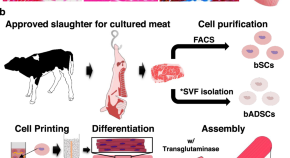
Engineered whole cut meat-like tissue by the assembly of cell fibers using tendon-gel integrated bioprinting
Mammalian cell-based cultured meat has mostly been unstructured, leaving a demand for artificial steak-like meat. Here the authors present an assembled steak-like tissue of bovine skeletal muscle, adipose tissue, and blood capillary tissue fabricated by tendon-gel integrated printing technology.
- Dong-Hee Kang
- Fiona Louis
- Michiya Matsusaki
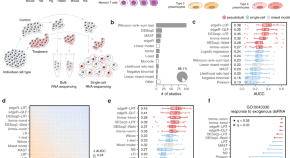
Confronting false discoveries in single-cell differential expression
Differential expression analysis of single-cell transcriptomics allows scientists to dissect cell-type-specific responses to biological perturbations. Here, the authors show that many commonly used methods are biased and can produce false discoveries.
- Jordan W. Squair
- Matthieu Gautier
- Grégoire Courtine
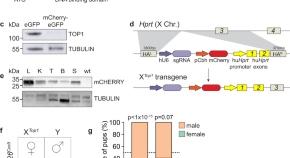
CRISPR-Cas9 effectors facilitate generation of single-sex litters and sex-specific phenotypes
In areas such as animal research and agriculture a single sex is often required in abundance, leading to wasted resources and ethical considerations. Here the authors develop a CRISPR/Cas9 mediated synthetic lethal system that enables the production of single sex offspring that can be repurposed for use in multiple organisms.
- Charlotte Douglas
- Valdone Maciulyte
- James M. A. Turner
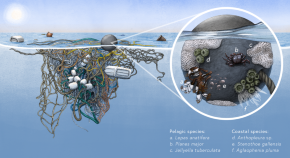
Emergence of a neopelagic community through the establishment of coastal species on the high seas
Discoveries of persistent coastal species in the open ocean shift our understanding of biogeographic barriers. Floating plastic debris from pollution now supports a novel sea surface community composed of coastal and oceanic species at sea that might portend significant ecological shifts in the marine environment.
- Linsey E. Haram
- James T. Carlton
- Gregory M. Ruiz

Identical twins carry a persistent epigenetic signature of early genome programming
The mechanisms underlying how monozygotic (or identical) twins arise are yet to be determined. Here, the authors investigate this in an epigenome-wide association study, showing that monozygotic twinning has a characteristic DNA methylation signature in adult somatic tissues.
- Jenny van Dongen
- Scott D. Gordon
- Dorret I. Boomsma

Bird population declines and species turnover are changing the acoustic properties of spring soundscapes
Birdsong has long connected humans to nature. Historical reconstructions using bird monitoring and song recordings collected by citizen scientists reveal that the soundscape of birdsong in North America and Europe is both quieter and less varied, mirroring declines in bird diversity and abundance.
- C. A. Morrison
- S. J. Butler

Collapse of the mammoth-steppe in central Yukon as revealed by ancient environmental DNA
‘The timing and ecological dynamics of extinction in the late Pleistocene are not well understood. Here, the authors use sediment ancient DNA from permafrost cores to reconstruct the paleoecology of the central Yukon, finding a substantial turnover in ecosystem composition between 13,500-10,000 years BP and persistence of some species past their supposed extinctions.’
- Tyler J. Murchie
- Alistair J. Monteath
- Hendrik N. Poinar
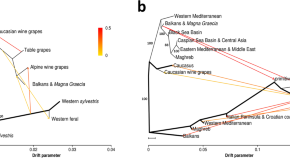
The genomes of 204 Vitis vinifera accessions reveal the origin of European wine grapes
Reports on the origin of European wine grapes are controversial. Here, the authors perform population genetics analyses on a large set of representative wine-making varieties and reveal a single domestication event at the origin of the entire germplasm followed by repeated introgression from wild populations.
- Gabriele Magris
- Irena Jurman
- Michele Morgante

Developmental genetics of color pattern establishment in cats
Intricate color patterns are a defining aspect of morphological diversity in the Felidae. Here the authors apply morphological and single-cell gene expression analysis to fetal skin of domestic cats to identify when, where, and how, during fetal development, felid color patterns are established.
- Christopher B. Kaelin
- Kelly A. McGowan
- Gregory S. Barsh

Unsupervised deep learning identifies semantic disentanglement in single inferotemporal face patch neurons
Little is known about the brain’s computations that enable the recognition of faces. Here, the authors use unsupervised deep learning to show that the brain disentangles faces into semantically meaningful factors, like age or the presence of a smile, at the single neuron level.
- Irina Higgins
- Matthew Botvinick
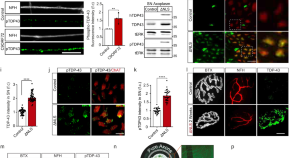
Axonal TDP-43 condensates drive neuromuscular junction disruption through inhibition of local synthesis of nuclear encoded mitochondrial proteins
Here, the authors show in human iPSC-derived motor neurons from ALS patients and a TDP-43 mouse model that axonal TDP-43 forms G3BP1 positive RNP condensates, which sequester mRNA of nuclear encoded mitochondrial proteins and decrease local protein synthesis in motor neuron axons and neuromuscular junctions.
- Topaz Altman
- Ariel Ionescu
- Eran Perlson
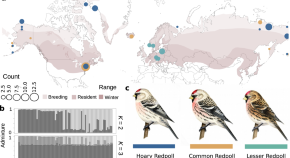
A supergene underlies linked variation in color and morphology in a Holarctic songbird
Trait genetic architecture influences how populations evolve and adapt. Genomic analysis finds that an inversion links genetic variation controlling redpoll finch color and bill shape, allowing the maintenance of latitudinal ecotypes despite a genome largely homogenized by gene flow.
- Erik R. Funk
- Nicholas A. Mason
- Scott A. Taylor

The long lives of primates and the ‘invariant rate of ageing’ hypothesis
The ‘invariant rate of ageing’ hypothesis suggests that the rate of ageing tends to be constant within species. Here, Colchero et al. find support for the hypothesis across primates, including humans, suggesting biological constraints on the rate of ageing.
- Fernando Colchero
- José Manuel Aburto
- Susan C. Alberts
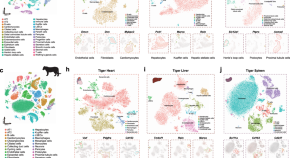
Single cell atlas for 11 non-model mammals, reptiles and birds
Here the authors report single-nucleus RNA sequencing for several anatomical locations in 11 species, including cat, dog, hamster, lizard, goat, rabbit, duck, pigeon, pangolin, tiger, and deer, highlighting coexpression of SARS-CoV-2 entry factors ACE2 and TMPRSS2 .
- Dongsheng Chen
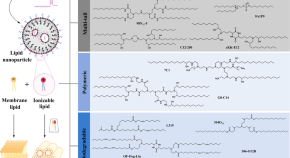
An ionizable lipid toolbox for RNA delivery
RNA therapeutics have benefited significantly from decades of research on lipid nanoparticles, specifically its key component—the ionizable lipid. This comment discusses the major ionizable lipid types, and provides perspectives for future development.
- Xuexiang Han
- Hanwen Zhang
- Michael J. Mitchell

Dinosaur biodiversity declined well before the asteroid impact, influenced by ecological and environmental pressures
Dinosaurs are thought to have been driven extinct by an asteroid impact 66 million years ago. Here, Condamine et al. show that six major dinosaur families were already in decline in the preceding 10 million years, possibly due to global cooling and competition among herbivores.
- Fabien L. Condamine
- Guillaume Guinot
- Philip J. Currie

Evolution and dispersal of snakes across the Cretaceous-Paleogene mass extinction
Snakes are one of the most successful groups of living vertebrates, but the timing of their diversification is unclear. Combining molecular clocks, fossils, and biogeography, Klein et al. show that snakes experienced a diversification, and underwent dispersal, around the time of the end-Cretaceous mass extinction.
- Catherine G. Klein
- Davide Pisani
- Nicholas R. Longrich

Inference and analysis of cell-cell communication using CellChat
Single-cell methods record molecule expressions of cells in a given tissue, but understanding interactions between cells remains challenging. Here the authors show by applying systems biology and machine learning approaches that they can infer and analyze cell-cell communication networks in an easily interpretable way.
- Christian F. Guerrero-Juarez
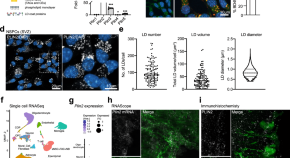
Lipid droplet availability affects neural stem/progenitor cell metabolism and proliferation
Lipid droplets (LDs) are central to lipid metabolism, which is known to regulate neural stem cell behavior. Here, the authors show that LDs influence neural stem cell proliferation and metabolic activity and change upon differentiation or quiescence.
- Mergim Ramosaj
- Sofia Madsen
- Marlen Knobloch
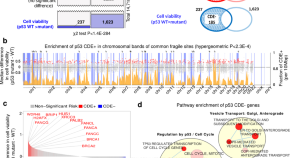
A systematic genome-wide mapping of oncogenic mutation selection during CRISPR-Cas9 genome editing
CRISPR-Cas9 gene editing can induce a p53 mediated damage response. Here the authors investigate the possibility of selection of pre-existing cancer driver mutations during CRISPR-Cas9 knockout based gene editing and identify KRAS mutants that may confer a selected advantage to edited cells.
- Sanju Sinha
- Karina Barbosa
- Eytan Ruppin
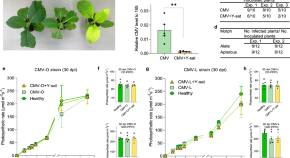
A plant virus satellite RNA directly accelerates wing formation in its insect vector for spread
The cucumber mosaic virus is accompanied by short RNA molecules, satellite RNAs. This study shows that leaves infected with Y-satellite RNA preferentially attract aphids and manipulate aphid physiology to promote their spread to neighbouring plants.
- Wikum H. Jayasinghe
- Chikara Masuta
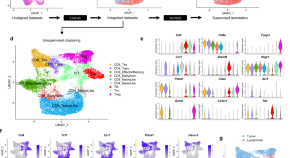
Interpretation of T cell states from single-cell transcriptomics data using reference atlases
One challenge of single cell RNA sequencing analysis is how to consistently identify cell subtypes and states across different datasets. Here the authors propose the use of a reference single-cell atlas as a stable system of coordinates to characterize T cell states across studies, diseases and species.
- Massimo Andreatta
- Jesus Corria-Osorio
- Santiago J. Carmona

Face detection in untrained deep neural networks
Face-selective neurons are observed in the primate visual pathway and are considered as the basis of face detection in the brain. Here, using a hierarchical deep neural network model of the ventral visual stream, the authors suggest that face selectivity arises in the complete absence of training.
- Seungdae Baek
- Se-Bum Paik
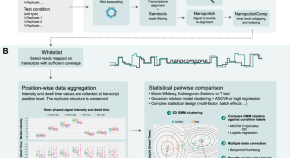
RNA modifications detection by comparative Nanopore direct RNA sequencing
Nanopore direct RNA Sequencing data contain information about the presence of RNA modifications, but their detection poses substantial challenges. Here the authors introduce Nanocompore, a new methodology for modification detection from Nanopore data.
- Adrien Leger
- Paulo P. Amaral
- Tony Kouzarides
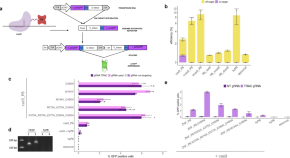
Find and cut-and-transfer (FiCAT) mammalian genome engineering
Mammalian genome engineering has advanced tremendously over the last decade, however there is still a need for robust gene writing with size scaling capacity. Here the authors present Find Cut-and-Transfer (FiCAT) technology to delivery large targeted payload insertion in cell lines and in vivo in mouse models.
- Maria Pallarès-Masmitjà
- Dimitrije Ivančić
Quick links
- Explore articles by subject
- Guide to authors
- Editorial policies

An official website of the United States government, Department of Justice.
Here's how you know
Official websites use .gov A .gov website belongs to an official government organization in the United States.
Secure .gov websites use HTTPS A lock ( Lock A locked padlock ) or https:// means you’ve safely connected to the .gov website. Share sensitive information only on official, secure websites.
Forensic Biology/Forensic DNA
Podcast episode: what's possible with rapid dna technology.
Forensic DNA analysis has played a crucial role in the investigation and resolution of thousands of crimes since the late 1980s.
The demand for tools and technologies in all areas of forensic science, including DNA testing, far exceed the current capabilities of the field. To help meet that demand, the NIJ has funded forensic DNA research and development projects for over a decade.
On this page, find links to articles, awards, events, publications, and multimedia related to forensic DNA.
- Improving Assault Victim Contact: From Evidence to Action
- Determining the Age-At-Death of Infants, Children, and Teens
- Forensic Science Research and Development Technology Working Group: Operational Requirements
Events and Trainings
- DNA Mixtures
- Advanced Forensic Genetic Genealogy
- The Increased Value of Forensic Science to Lead Gun Crime Investigations Part II
- View related awards
Publications
- Targeted Recovery of Male Cells in a Male and Female Same-cell Mixture
- Death Investigation: A Guide for the Scene Investigator, 2024
- Forensic DNA Interpretation and Human Factors: Improving Practice Through a Systems Approach
- Find sites with statistics related to: DNA (Deoxyribonucleic Acid)

IMAGES
VIDEO
COMMENTS
Research Topics in Biology for Undergraduates. 41. Investigating the effects of pollutants on local plant species. Microbial diversity and ecosystem functioning in a specific habitat. Understanding the genetics of antibiotic resistance in bacteria. Impact of urbanization on bird populations and biodiversity. Investigating the role of pheromones ...
The first of our potentially easy biology research topics: climate change and ecosystems. Investigate how ecosystems respond and adapt to the changing climate. And learn about shifts in species distributions, phenology, and ecological interactions. 1) How are different ecosystems responding to temperature changes and altered precipitation ...
Molecular Biology Research Topics For Undergraduates. 31. Studying the structure and function of DNA and RNA molecules. 32. Analyzing the regulation of gene expression in eukaryotic cells. 33. Investigating the mechanisms of DNA replication and repair. 34. Studying the role of non-coding RNAs in gene regulation.
The concept includes anatomy, physiology, cell biology, biochemistry and biophysics, and covers all organisms from microorganisms, animals to plants. ... Research Highlights 30 Aug 2024 Nature ...
Marine Biology Research Topics. This subject explains orgasms in the sea, how they survive, and their interaction with their environment. If you have a flair for this field, the following Biology research topics may interest you: Discuss what quantitative ecology through modeling means; Smallest diatoms and marine logistics: discuss
Some biology topics are easier for non-biologists to get more excited about than others, though. Whether you're looking for a research topic for a college paper or an area to specialize in if you're majoring in biology, here are some of the most interesting things going on in the biology world right now. 1. CRISPR and Genetic Engineering
A List of Researchable Topics for Biology. A list of researchable topics for biology students starts with several interesting biological topics concerning sociological perspective and ethical issues. The most debatable subjects are abortion, human cloning, genetic researches and the new ethics that should be created to resolve these issues.
Biology Research Topics. Biology Research Topics are as follows: The role of gut microbiota in human health and disease. The effects of climate change on animal behavior and physiology. The molecular mechanisms of cancer development and progression. The evolutionary origins of human language. The impact of pesticides on insect populations and ...
Top 50 Life and Biological Sciences Articles. We are pleased to share with you the 50 most read Nature Communications articles* in life and biological sciences published in 2019. Featuring authors ...
Explore the latest research making an impact in your field. October 25, 2023 PLOS Biology Computational biology Genetics. Our biological science research journals cover a broad range of topics, from animal biology and plant science to genetic engineering, immunology, and microbiology. Read some of the latest and most talked about research from ...
Cell biology is the discipline of biological sciences that studies the structure, physiology, growth, reproduction and death of cells. Research in cell biology uses microscopic and molecular tools ...
3.9 15 Plant Pathology Biology Research Topics. 3.10 15 Animals Biology Research Topics. 3.11 15 Marine Biology Research Topics. 3.12 15 Zoology Research Topics. 3.13 15 Genetics Research Topics. 3.14 15 Biotechnology Research Topics. 3.15 15 Evolutionary Biology Research Topics. Biology is one of the most magnetic fields of study these days ...
Welcome to SciTechDaily.com's Biology News page, your ultimate destination for the latest discoveries, breakthroughs, and advancements in the fascinating world of biology. Here, we cover a wide range of topics, from molecular biology and genetics to ecology and evolutionary studies, ensuring that our readers stay up-to-date with the most recent developments in this ever-evolving field.
Biology research topics include many aspects of living beings, from molecular interactions to ecosystem dynamics. Some themes delve into the secrets of genetics, studying the subtle dance of DNA and RNA to understand heredity and mutation. Other topics cover the realm of microbiology, examining bacteria, viruses, and fungi that are essential to ...
This is one of the most fascinating biology research topics for anyone interested in the life-changing clinical applications of CRISPR. 3. Climate Change. There's no denying that climate change is one of the most pressing issues we're facing today. There's an urgent need for research into finding practical solutions.
Browse the 25 most downloaded Nature Communications articles across life and biological sciences published in 2022.
Bonus: 10 Newest Biology Research Topics; Biology research is a complex analytical work that is presented in clear findings and numerous biological occurrences' explanations. This type of research paper requires an attention-grabbing, appealing, and essential topic. It is important to choose a proper theme among interesting biology topics.
Relevant Research Topics. Selective telomerase activation to delay senescence. Inhibition of mTOR gene and gene products for longevity of life. Effects of diet (caloric restriction) on lifespan. Effect of altered energy generation capacity (epigenetic changes) on the process of aging.
Free biology research talks from the world's leading scientists. Talks are sorted by biology topics so you can find what interests you! Top. ... iBiology Research Talks by Topic. At the heart of iBiology are over 600 talks from the world's leading scientists, sharing their research, their experiences, and the joys of discovery. ...
Molecular Biology is the field of biology that studies the composition, structure and interactions of cellular molecules such as nucleic acids and proteins that carry out the biological processes ...
Metagenomics. Ecology. DNA expansion techniques. Astrobiology. Parasitism in aquatic organisms. Gram staining. The list above is in no way extensive in covering the topics related to biology and biology research paper topics you can write on. There are several other biology research project topics you can write on, but these comprise of ...
Stem Cell and Developmental Biology. 77 Massachusetts Ave, 68-132 | Cambridge, MA 02139 | 617-253-4701.
Featuring authors from around the world, these papers highlight valuable research from an international community. Browse all Top 25 subject area collections here .
Forensic DNA analysis has played a crucial role in the investigation and resolution of thousands of crimes since the late 1980s. The demand for tools and technologies in all areas of forensic science, including DNA testing, far exceed the current capabilities of the field. To help meet that demand, the NIJ has funded forensic DNA research and development projects for over a decade. On this ...